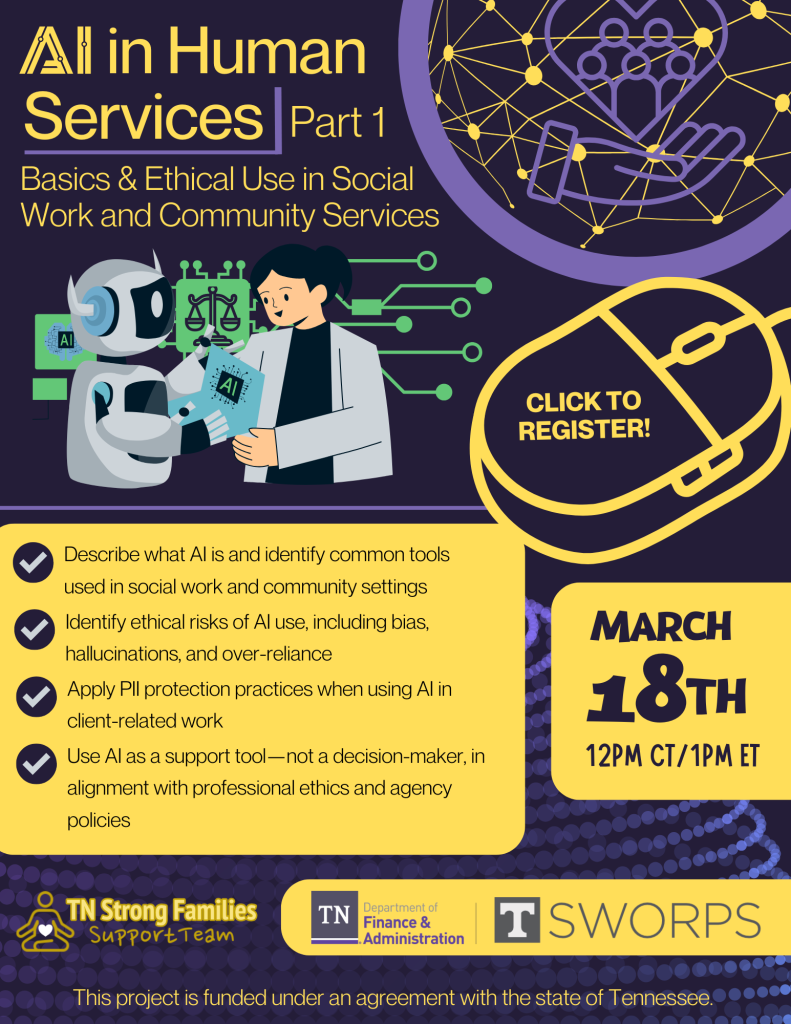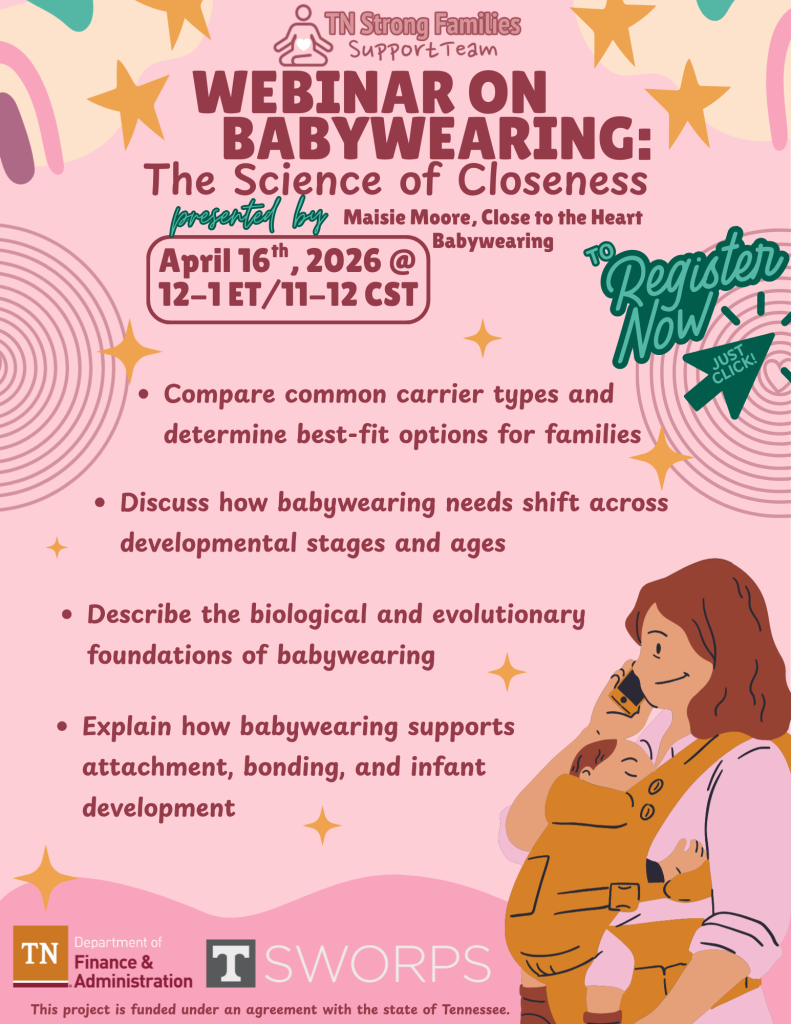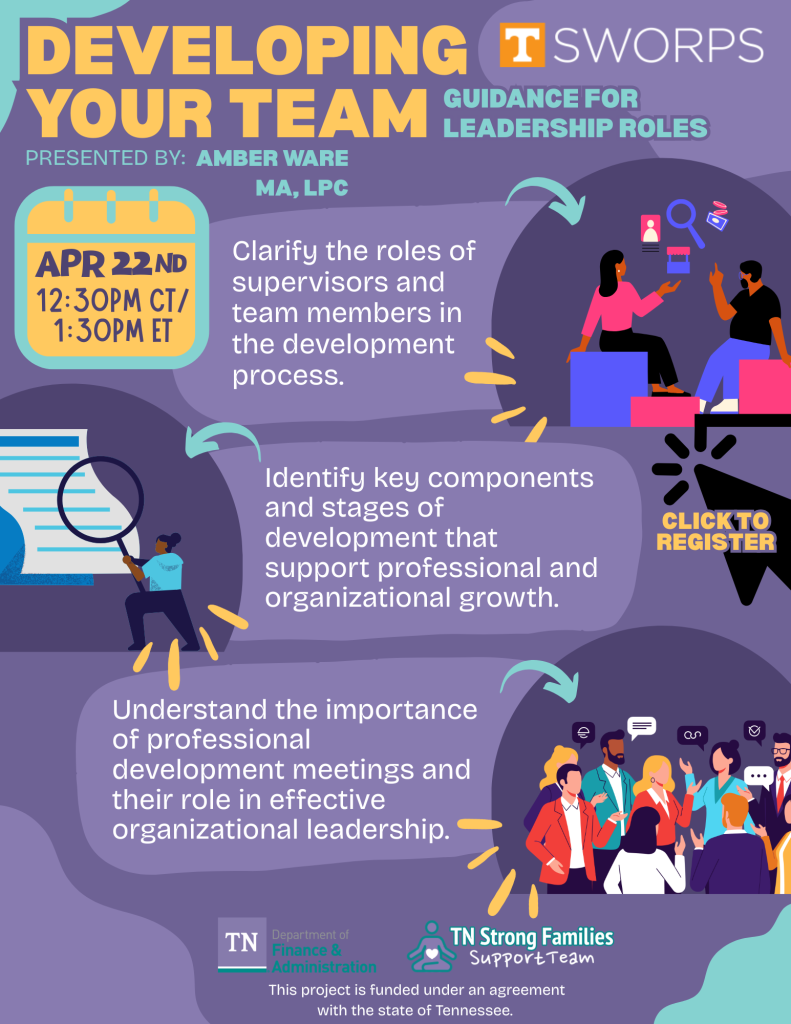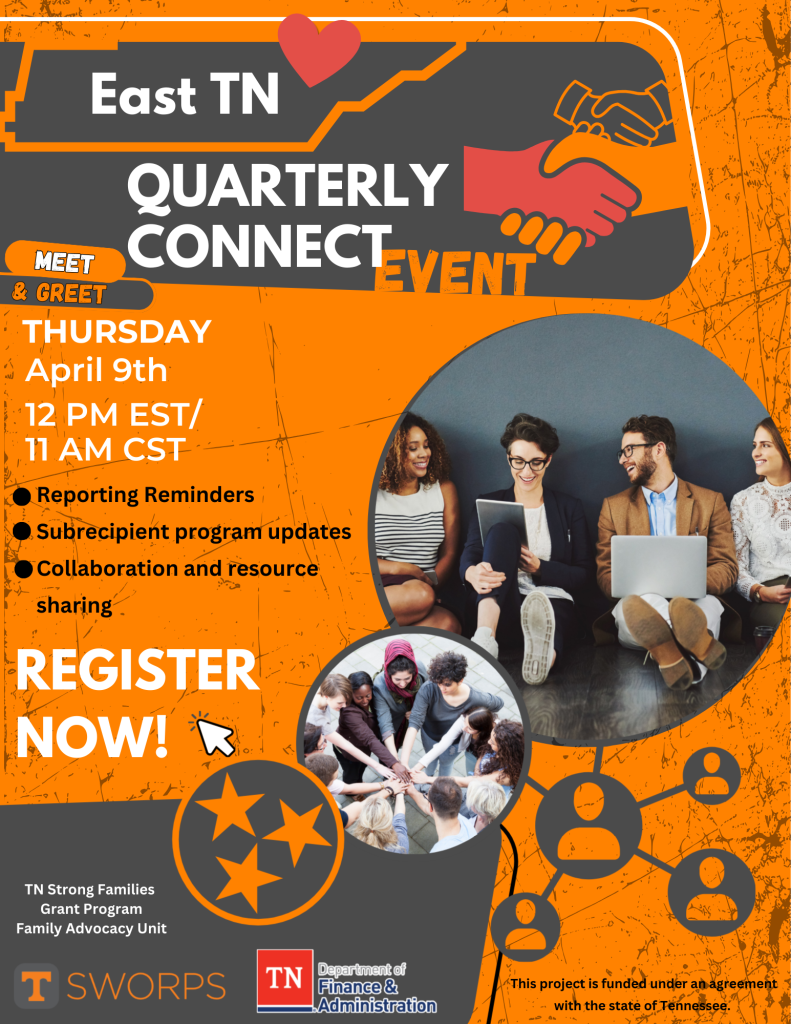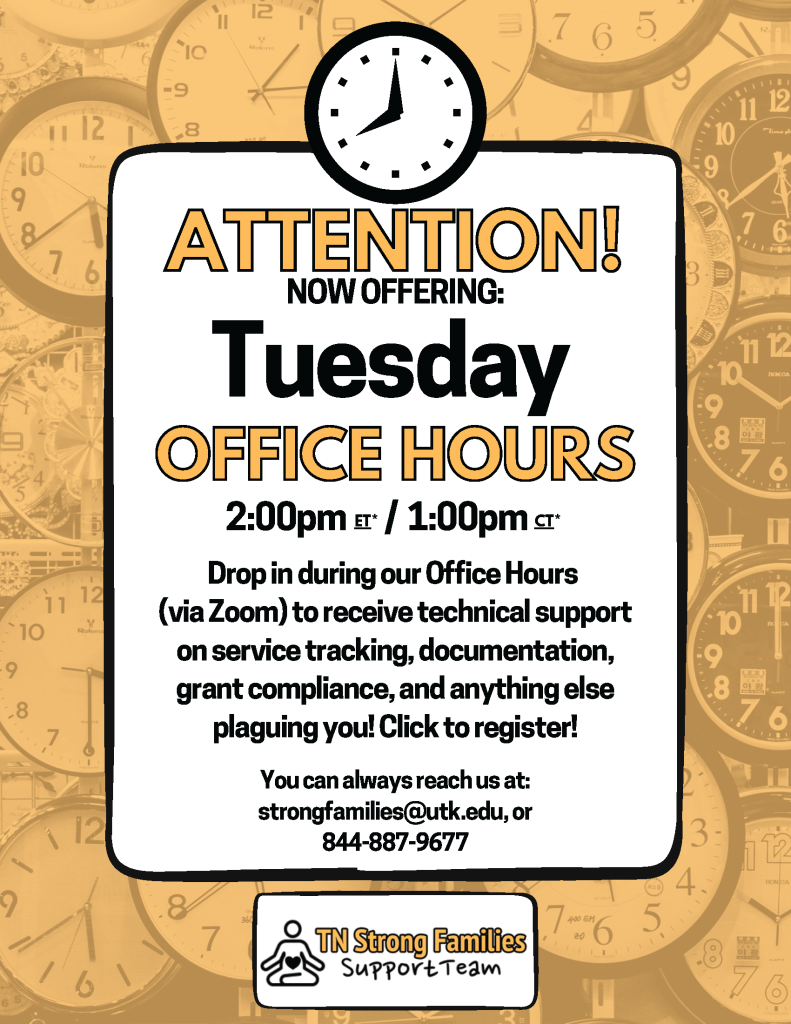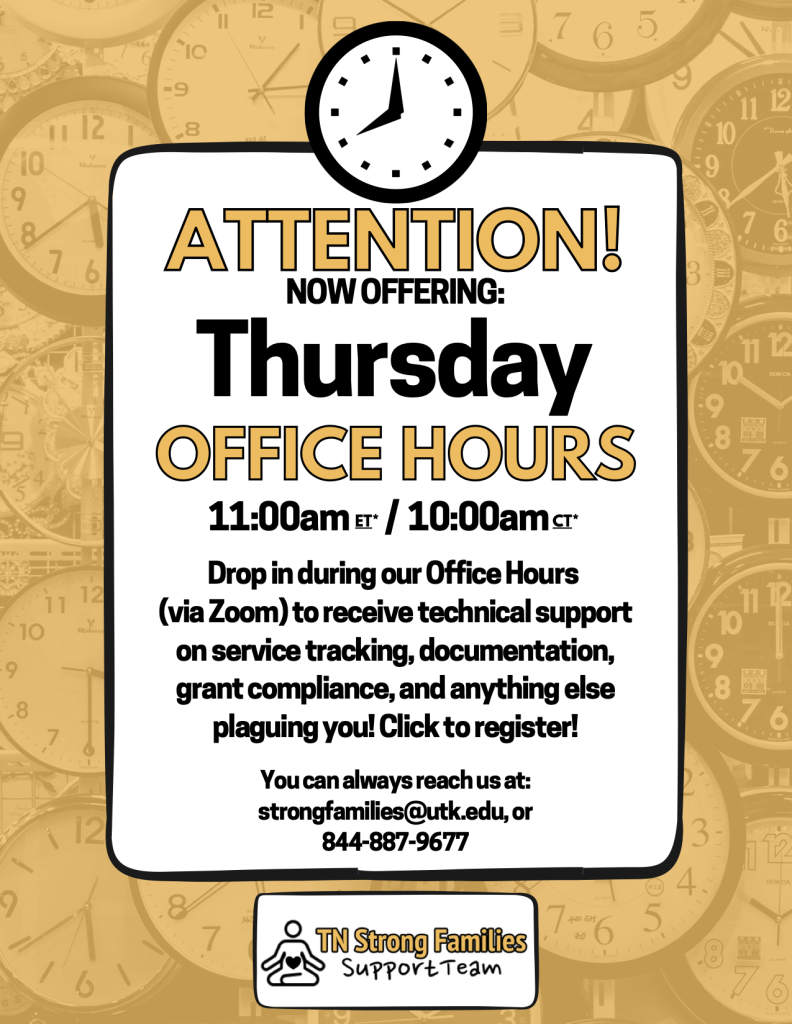Tennessee Strong Families Support Team

The Tennessee Strong Families Support Team is committed to providing applicants and recipients of the Strong Families Grant Program with the knowledge, support, resources, and technical assistance needed in implementing their approved projects and ensuring their success in making a positive impact for Tennessee mothers, children, and families.
Training
Previous Recordings
Watch Previous Webinars
43 Videos

1:14:39

55:15

1:30:02

58:29

27:28

35:52

54:09

58:45

1:21:28
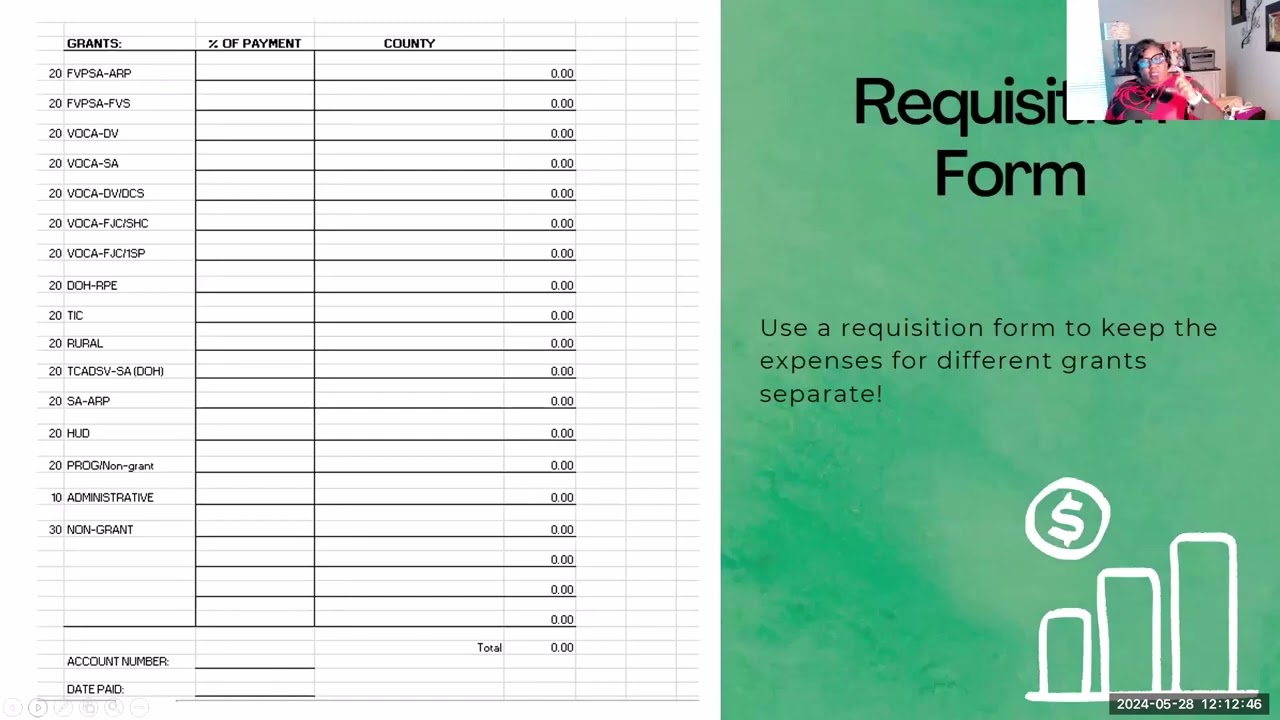
47:58

26:17

43:53

31:53

57:43
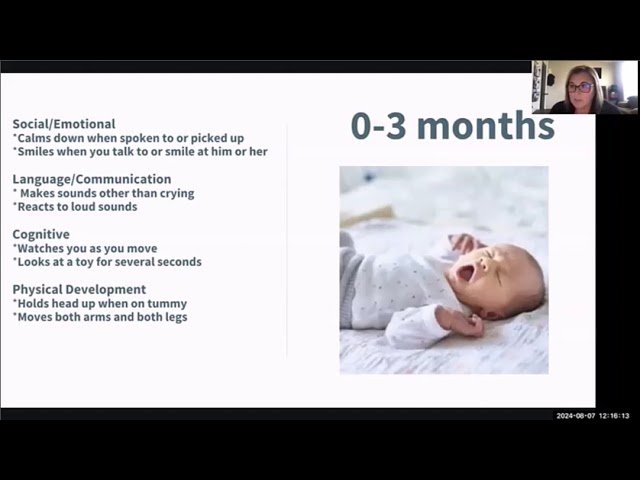
1:06:25
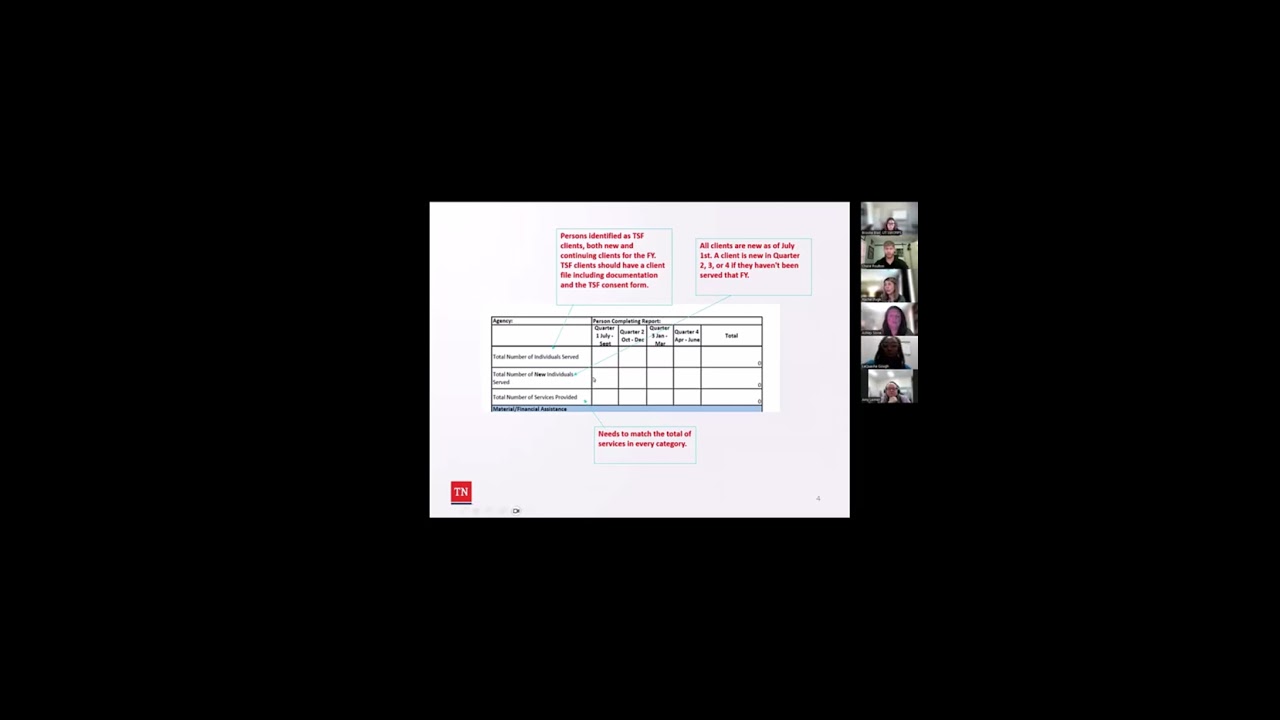
1:10:09
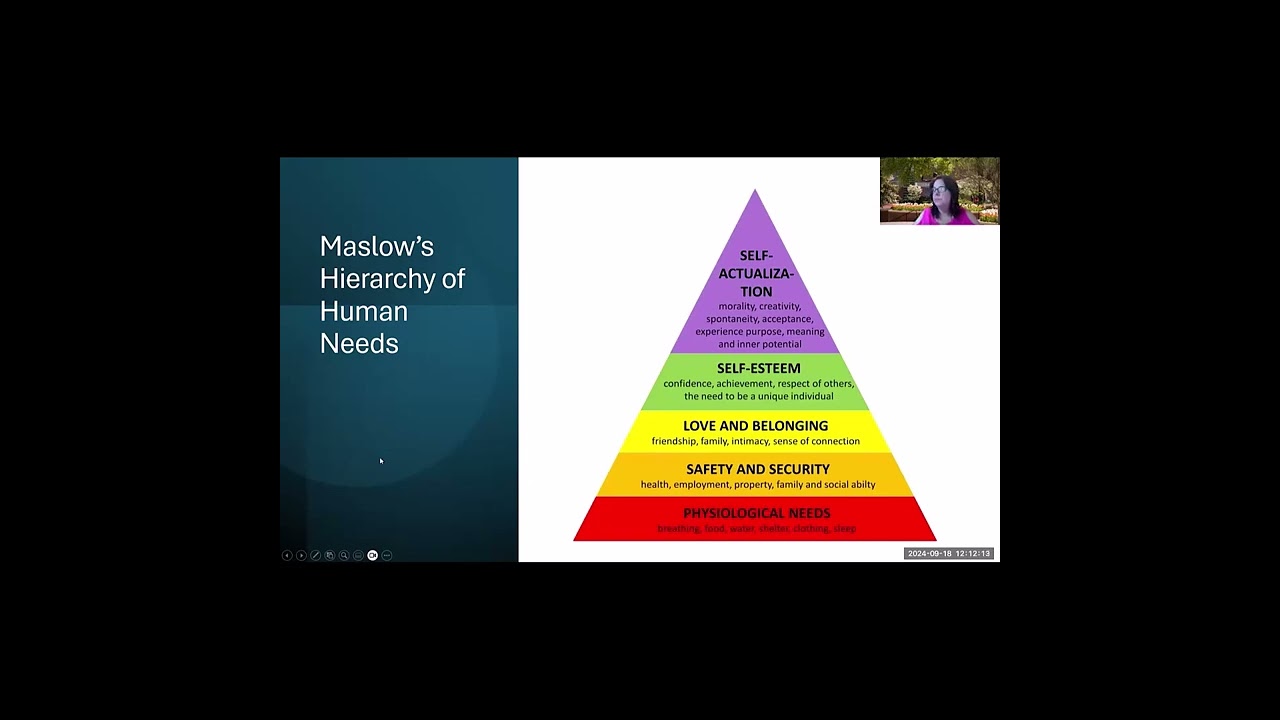
1:01:08
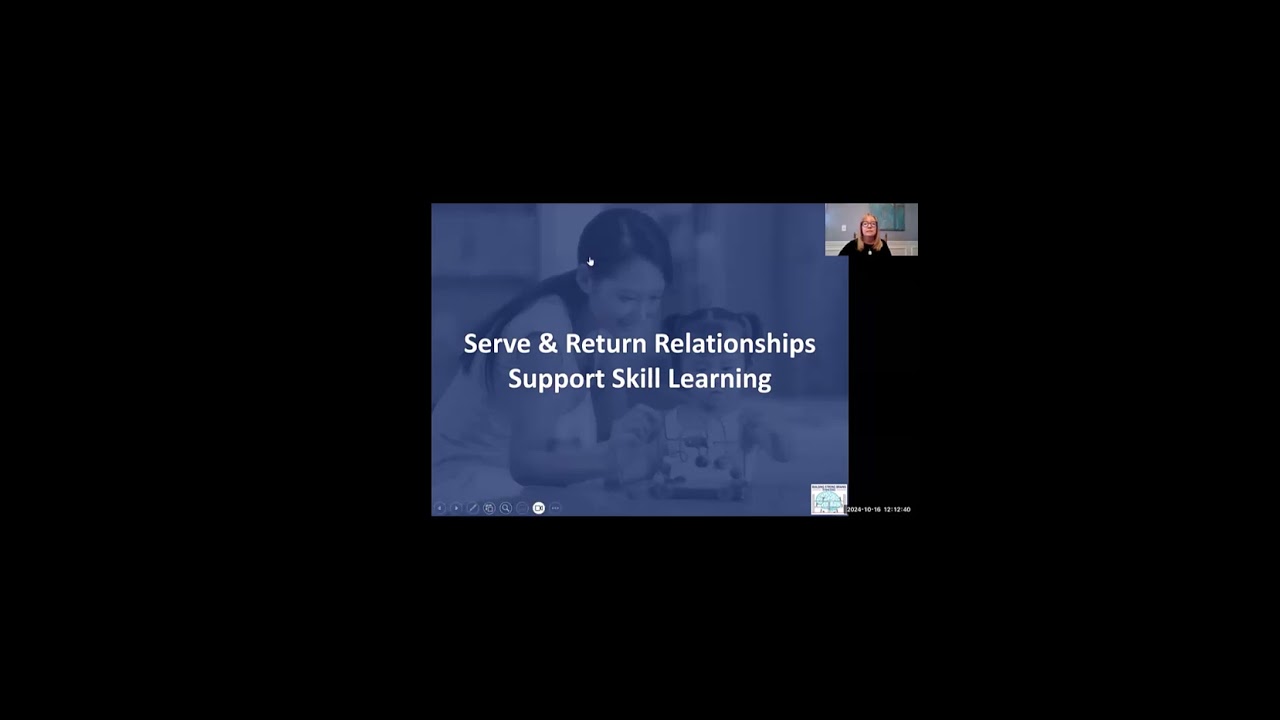
58:15
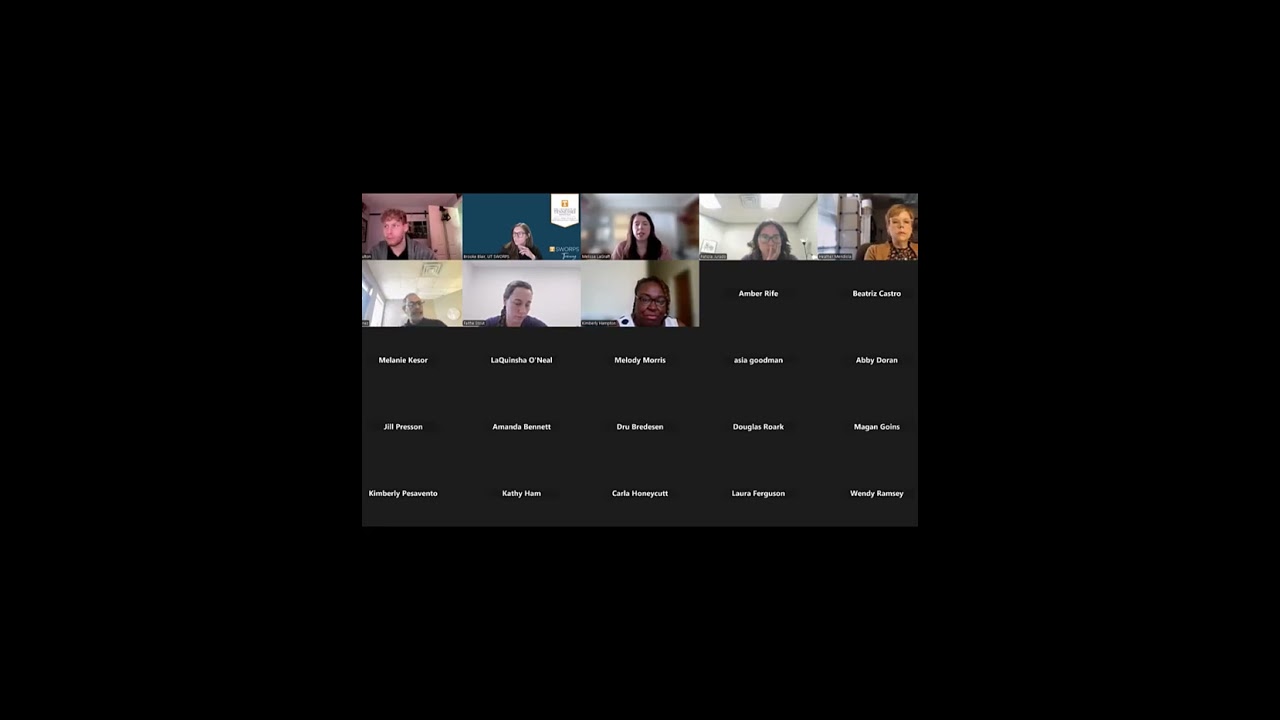
1:06:45
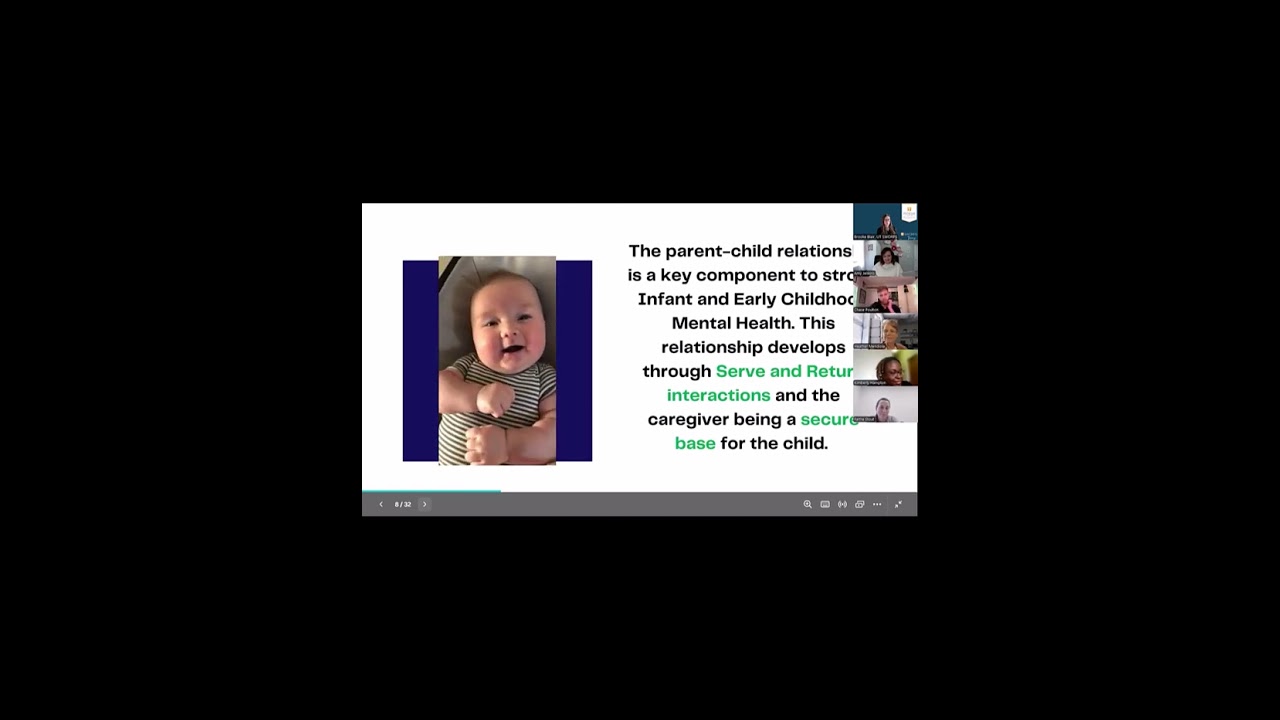
55:36

1:21:31
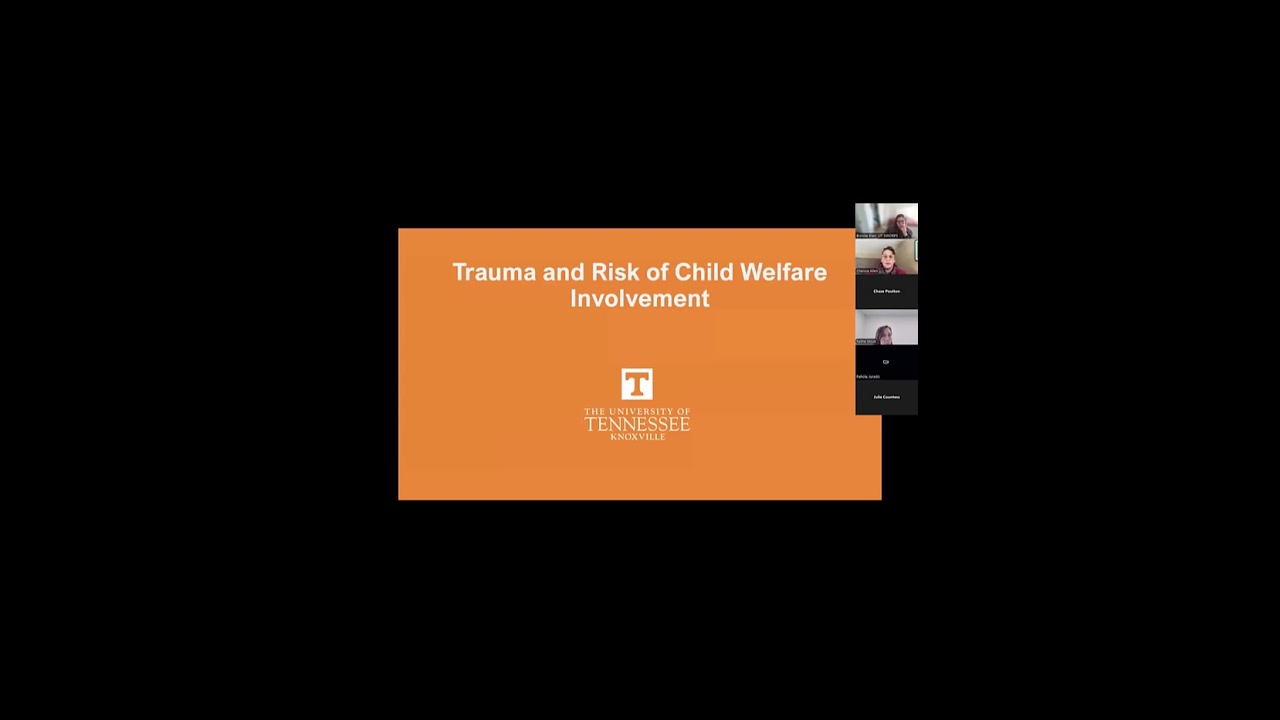
48:32
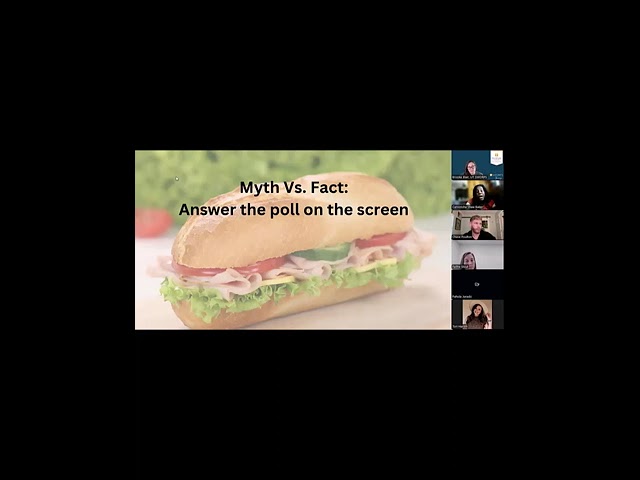
1:02:10

55:27

37:39
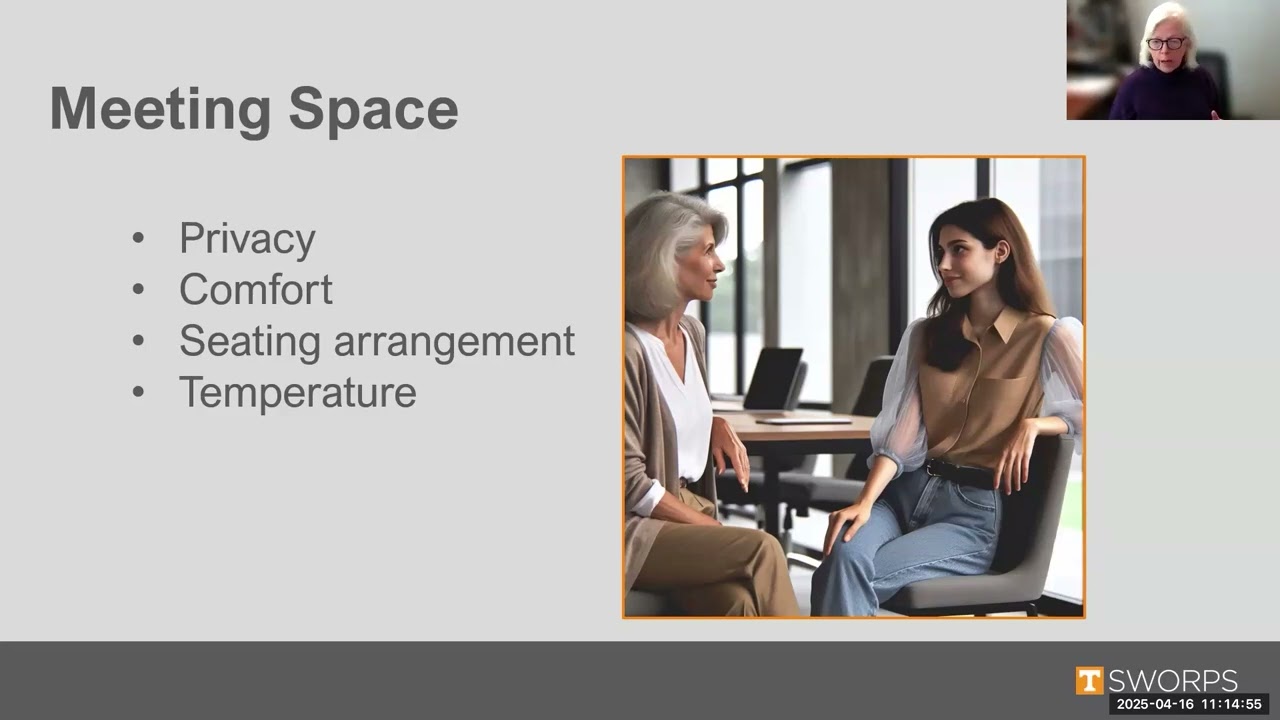
59:30

53:17

50:52
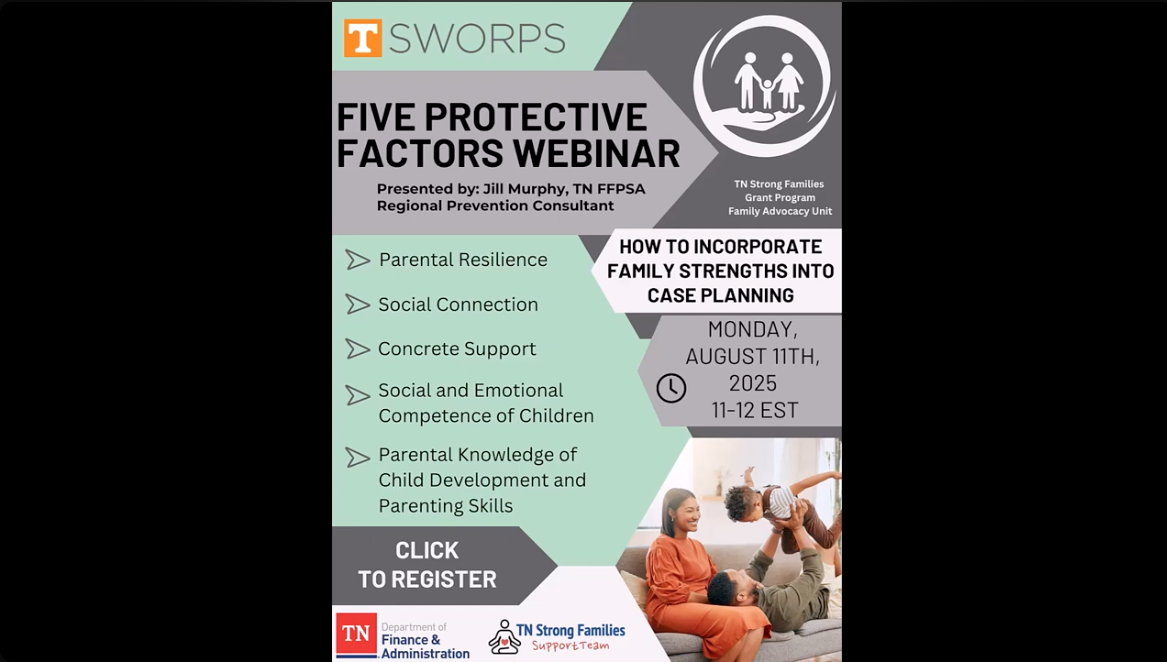
2:09
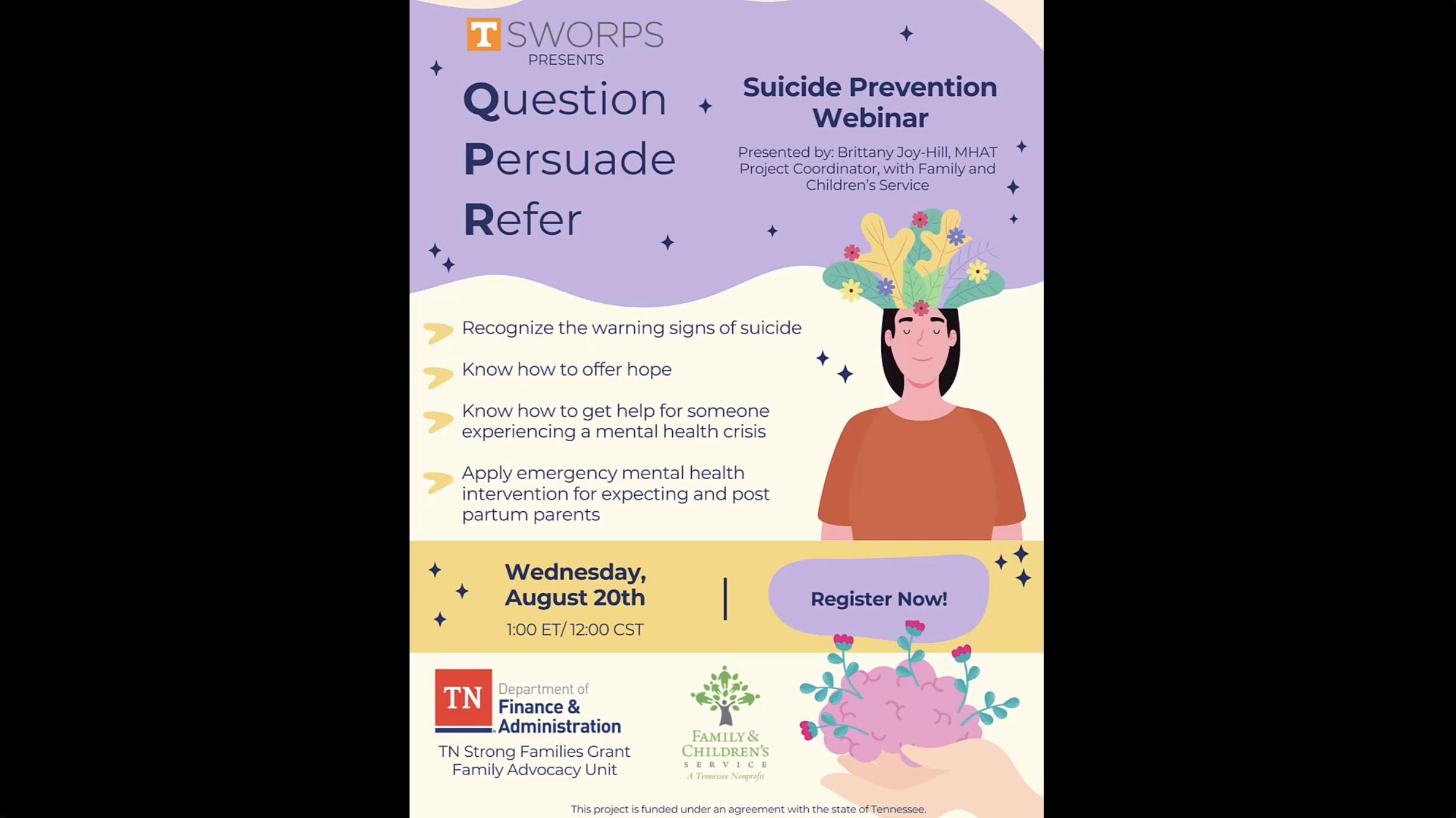
2:09
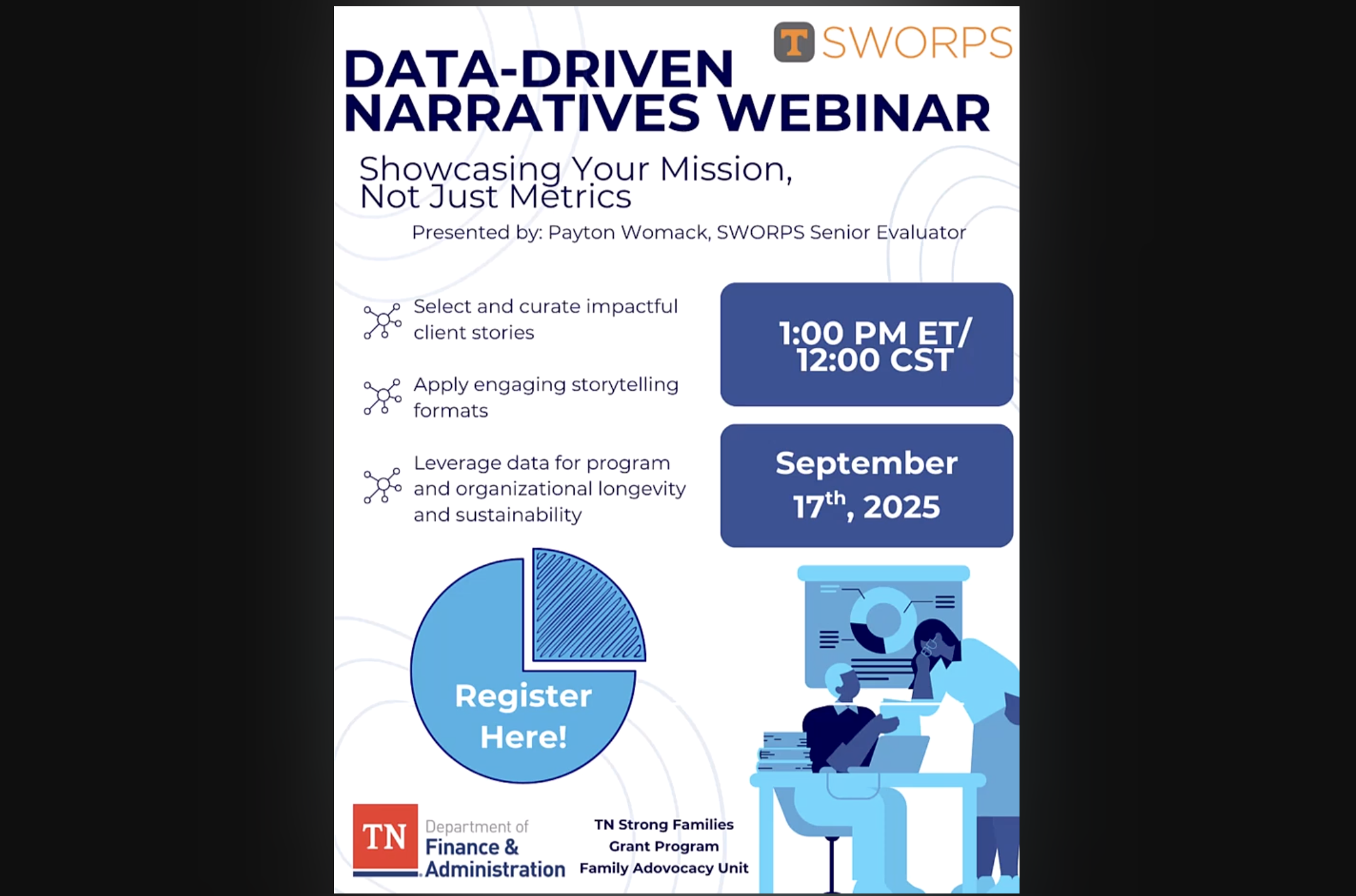
2:09
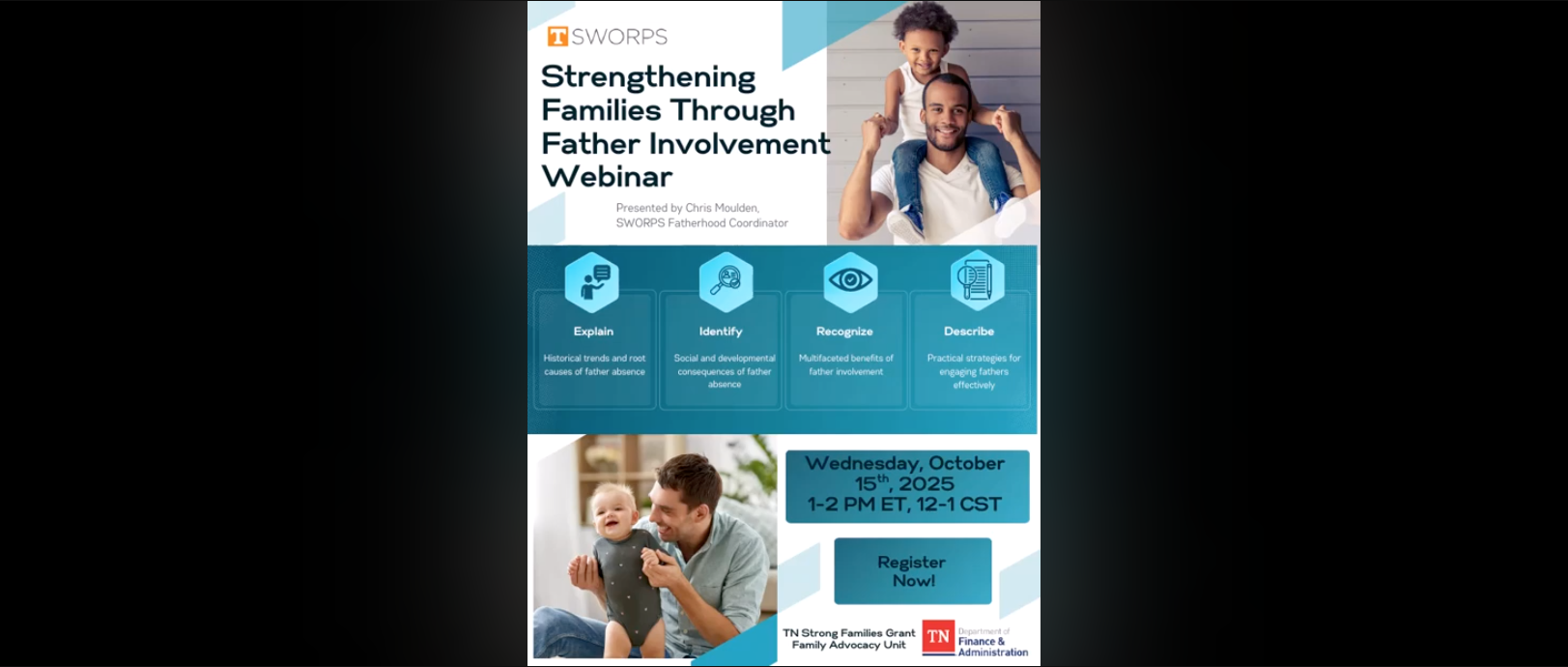
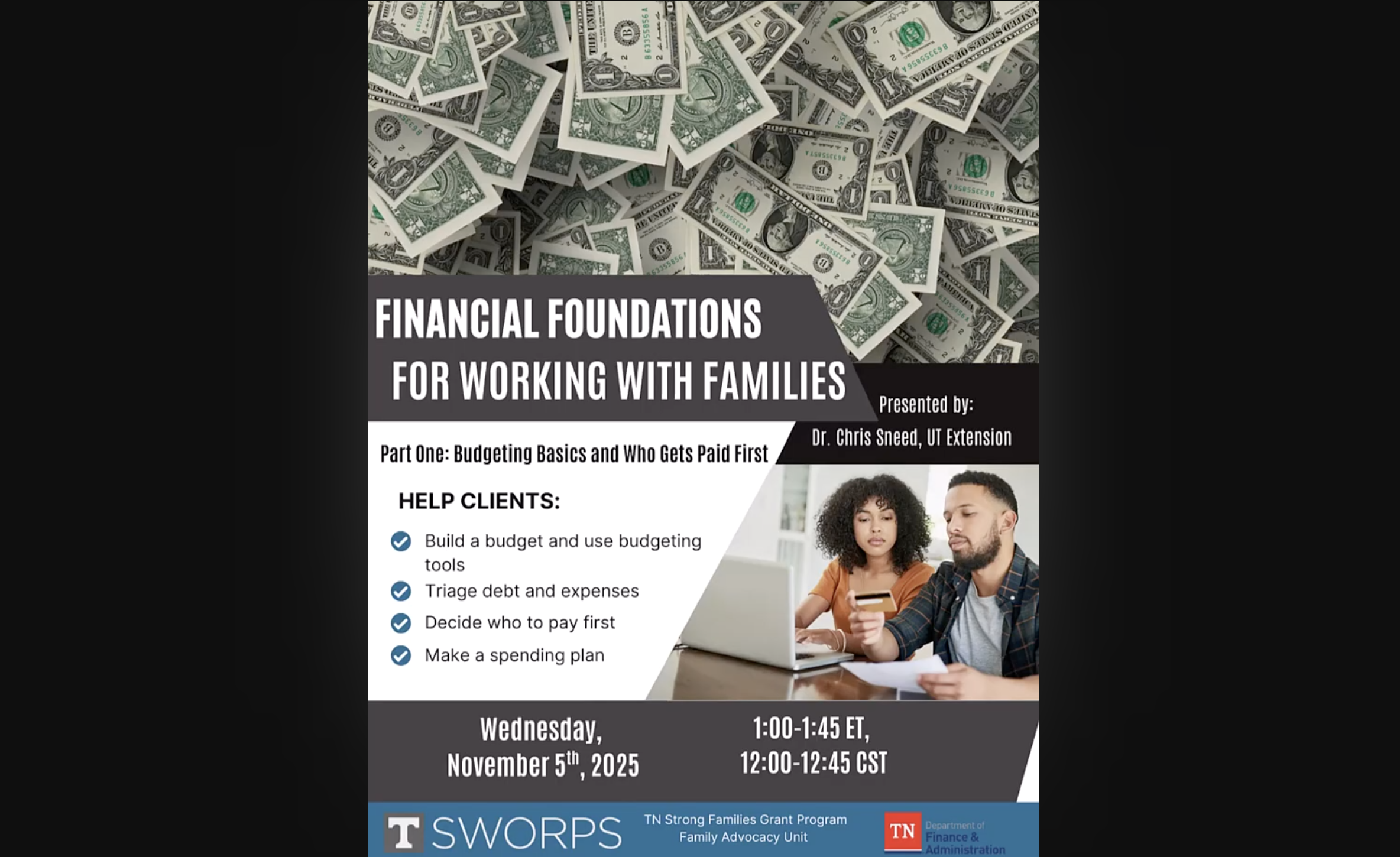
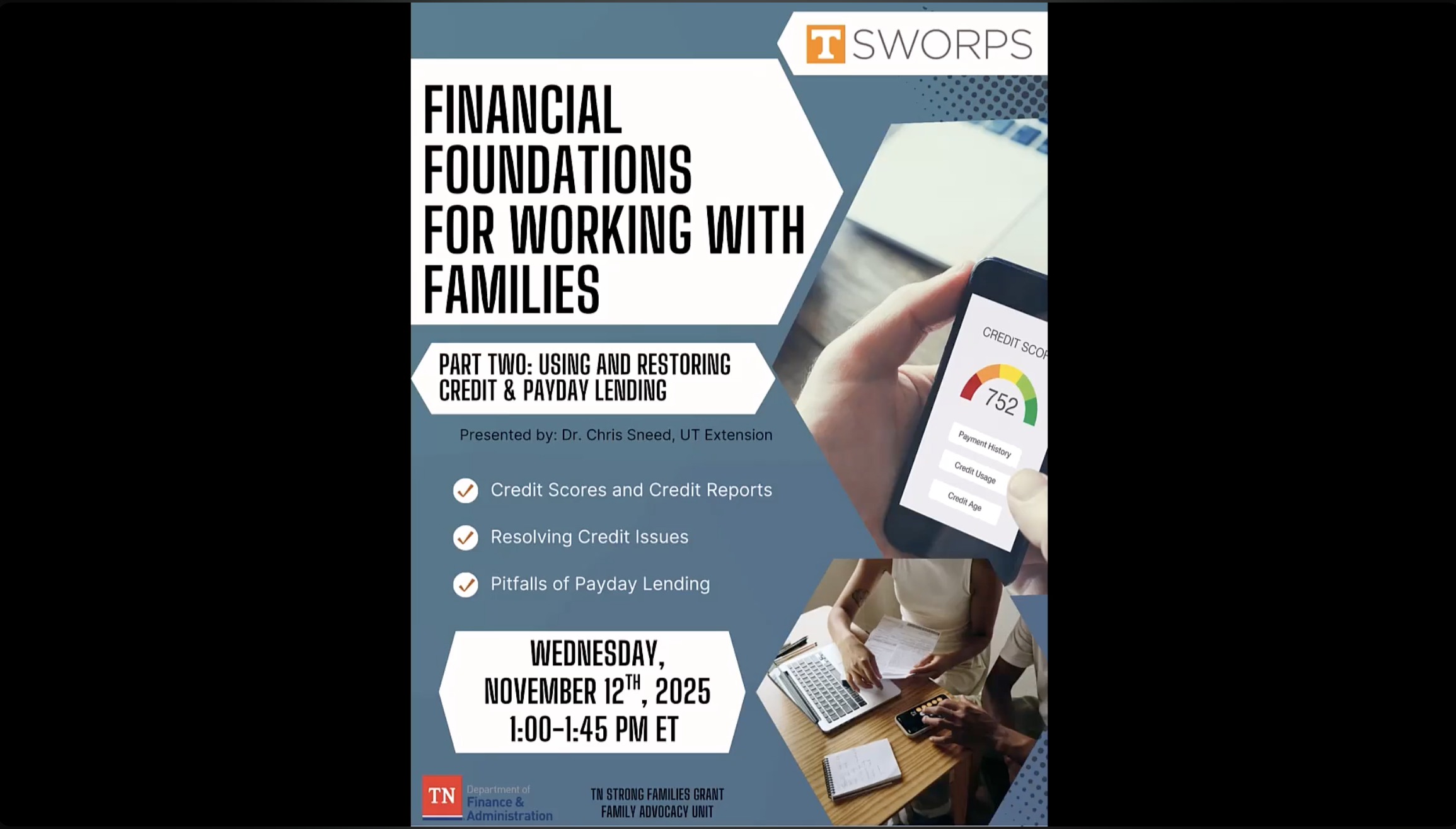
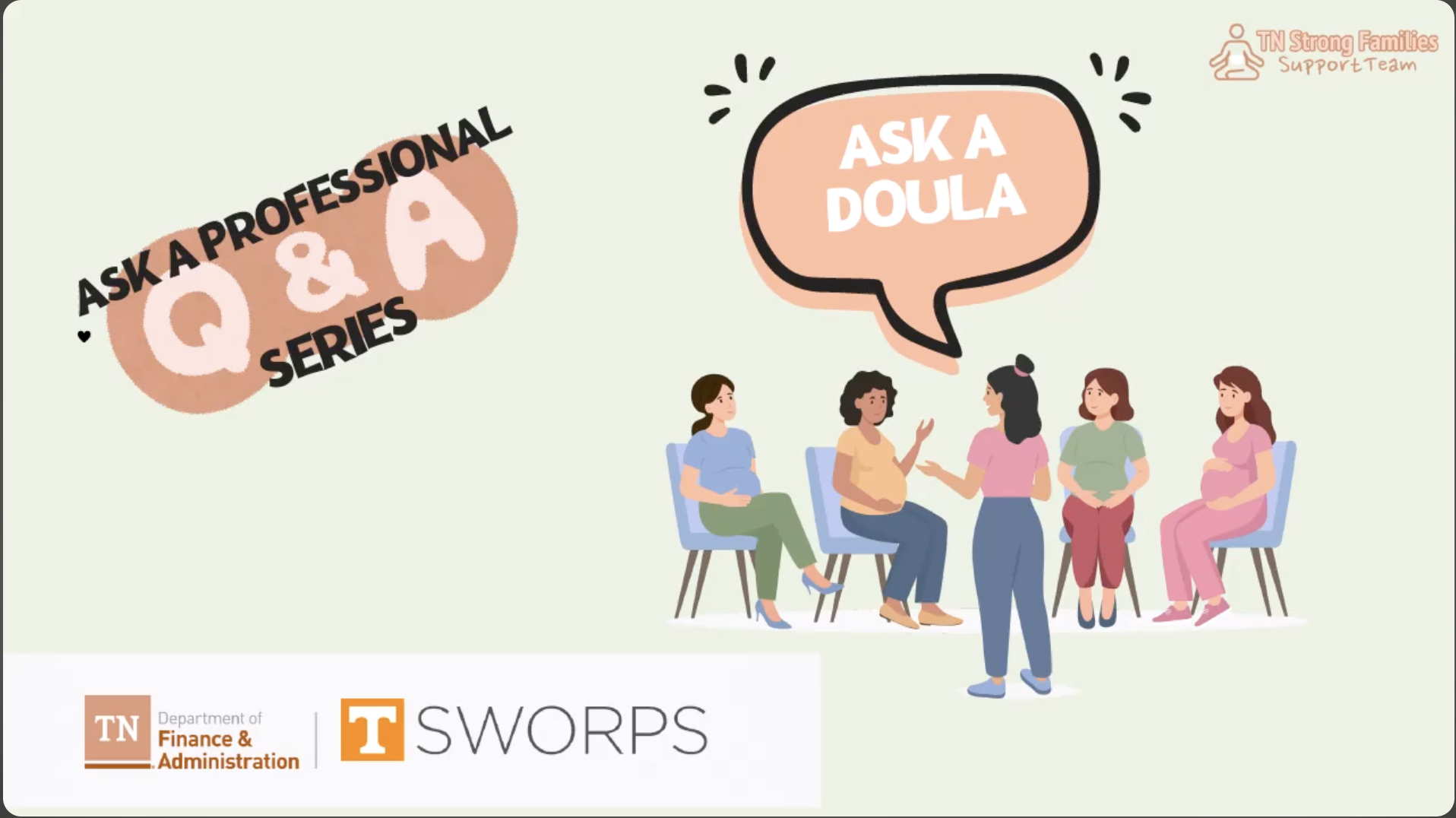
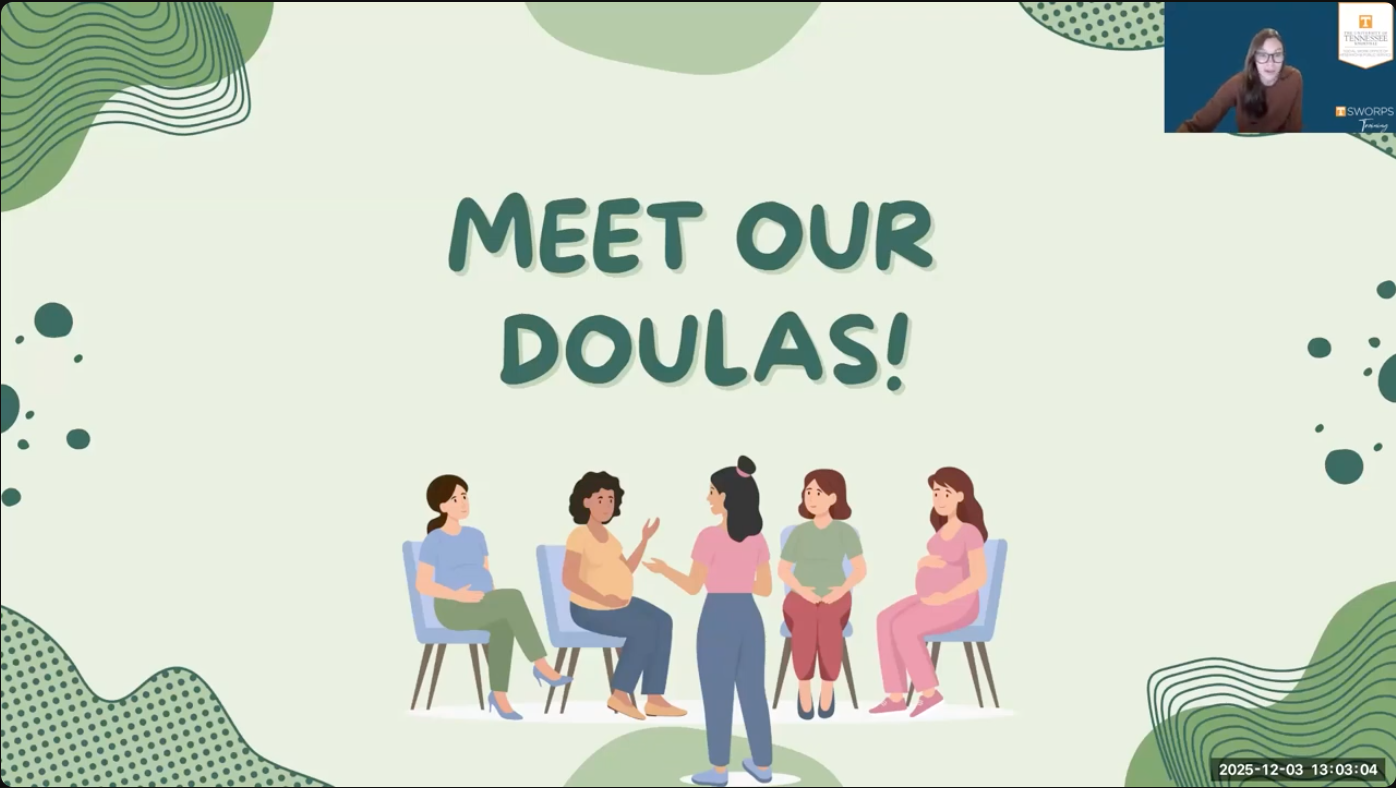
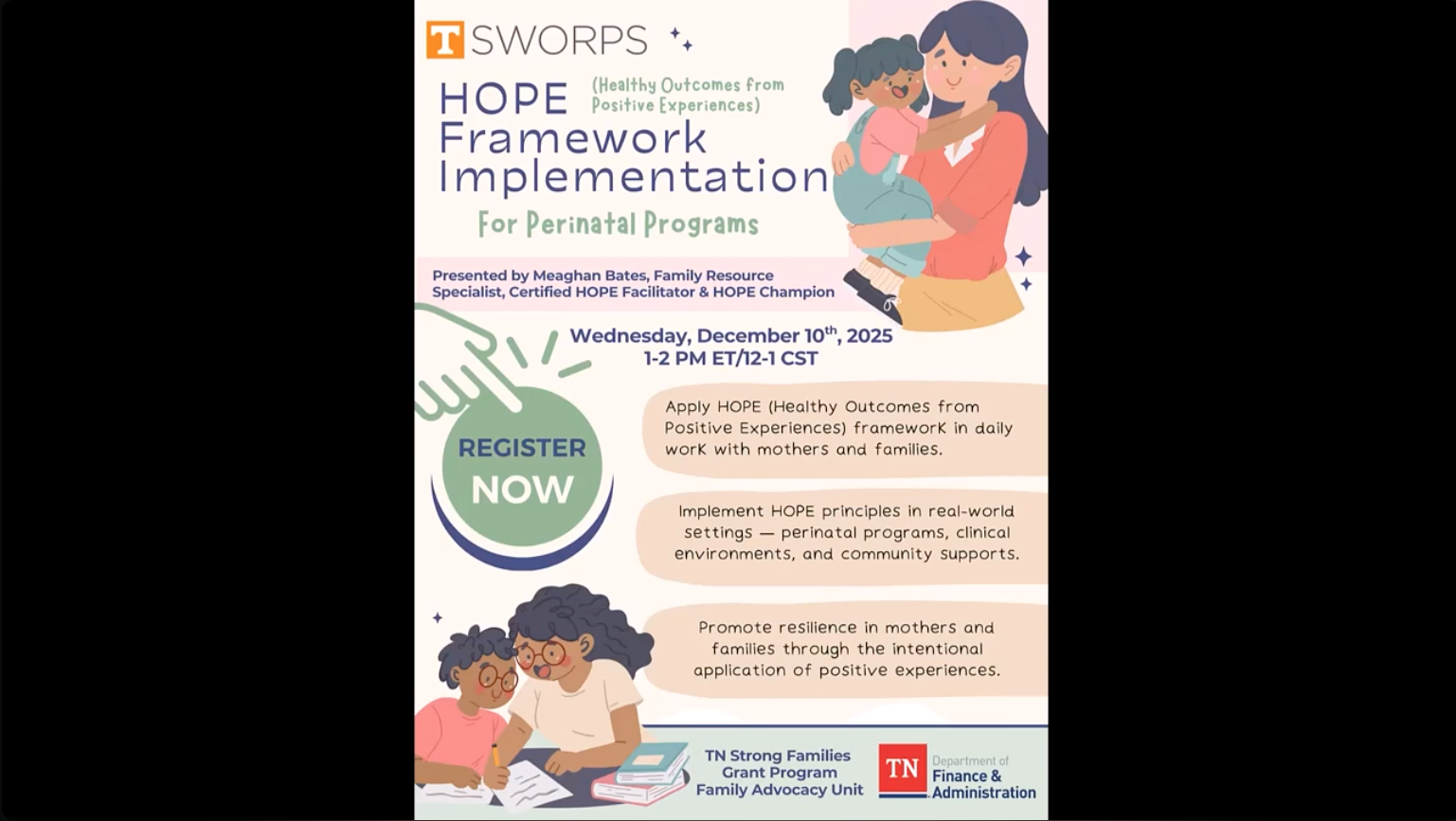
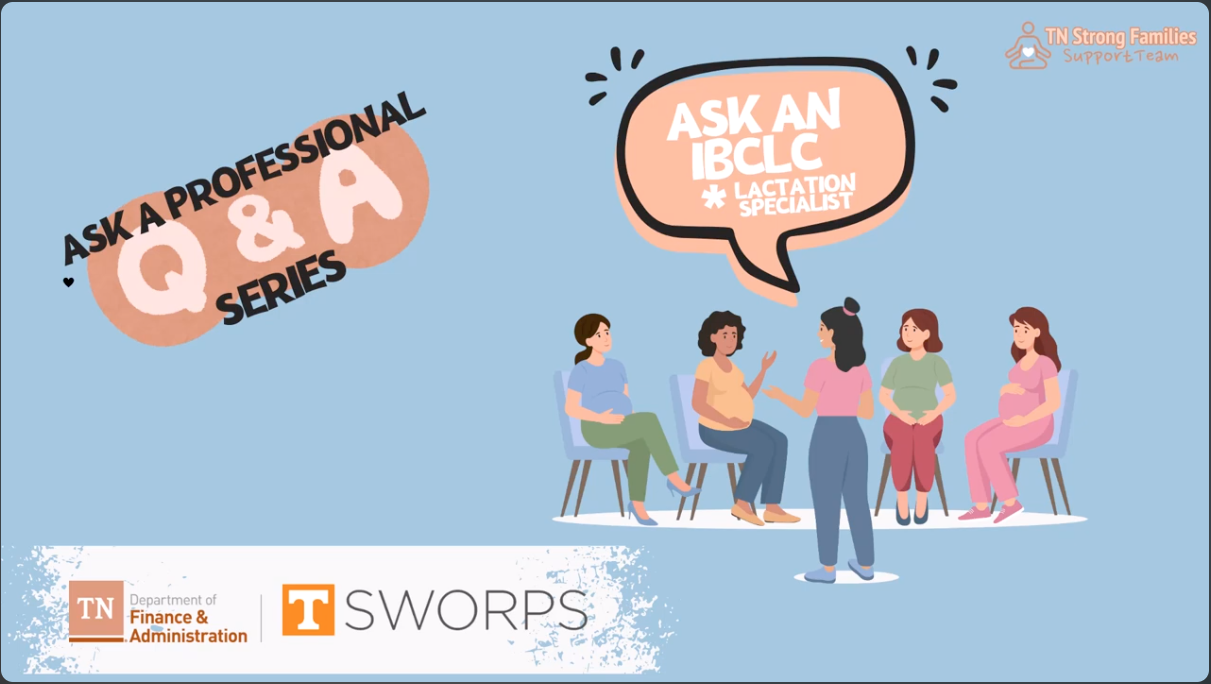
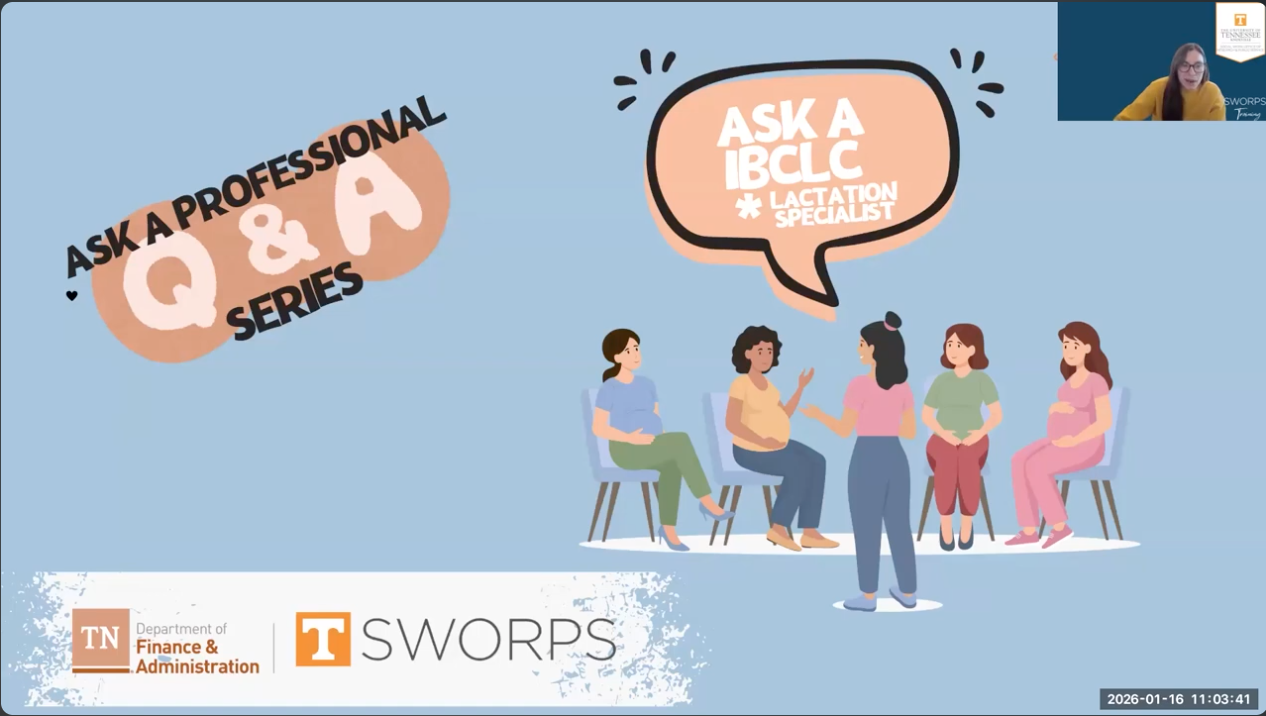
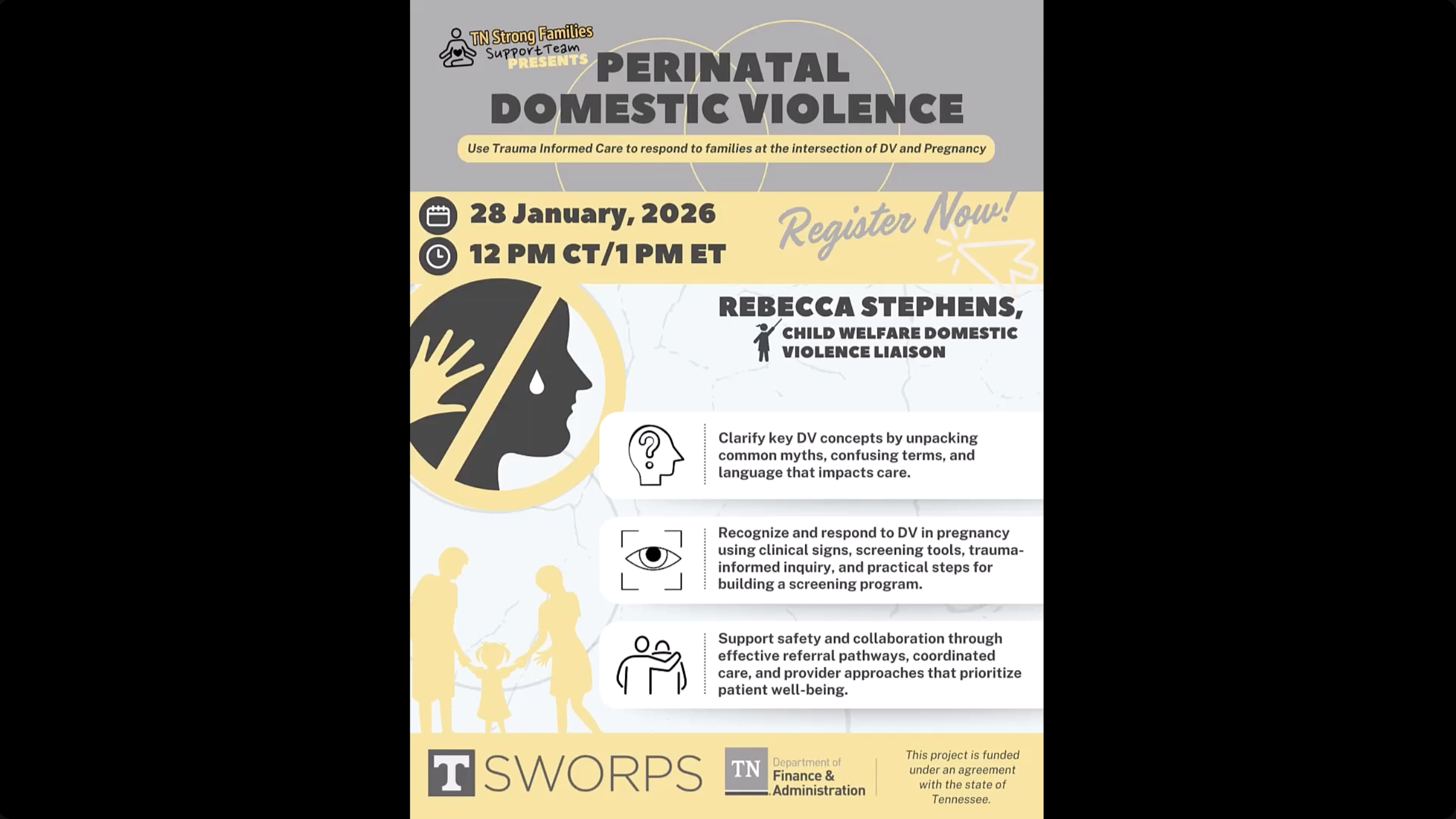
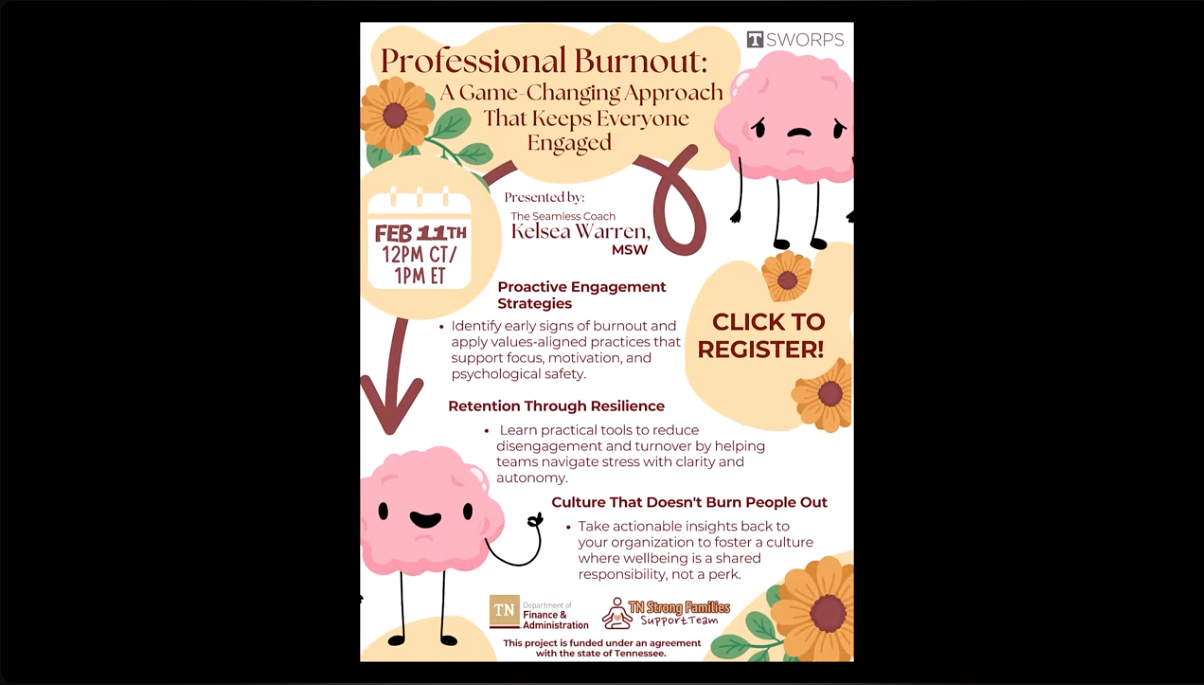
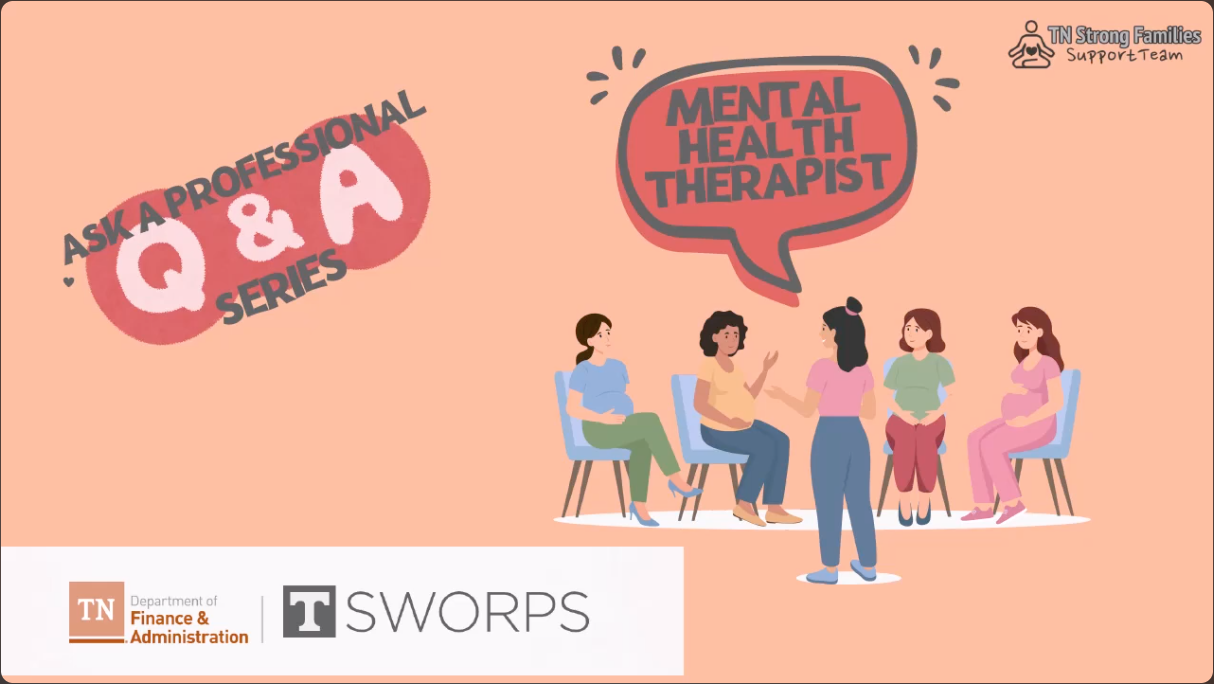
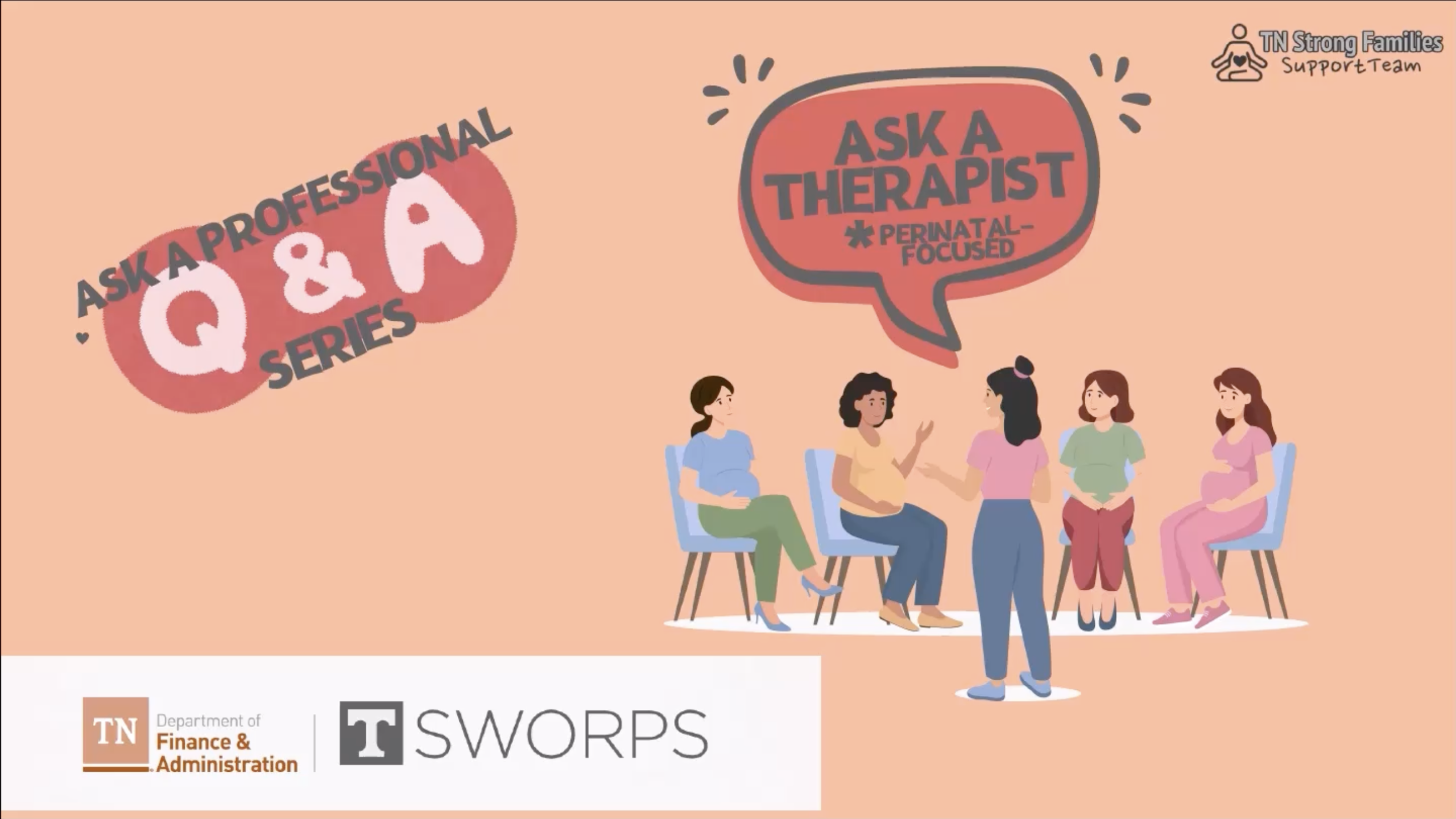
TSF Tracker Tutorials
Watch TSF Tracker Tutorials
5 Videos
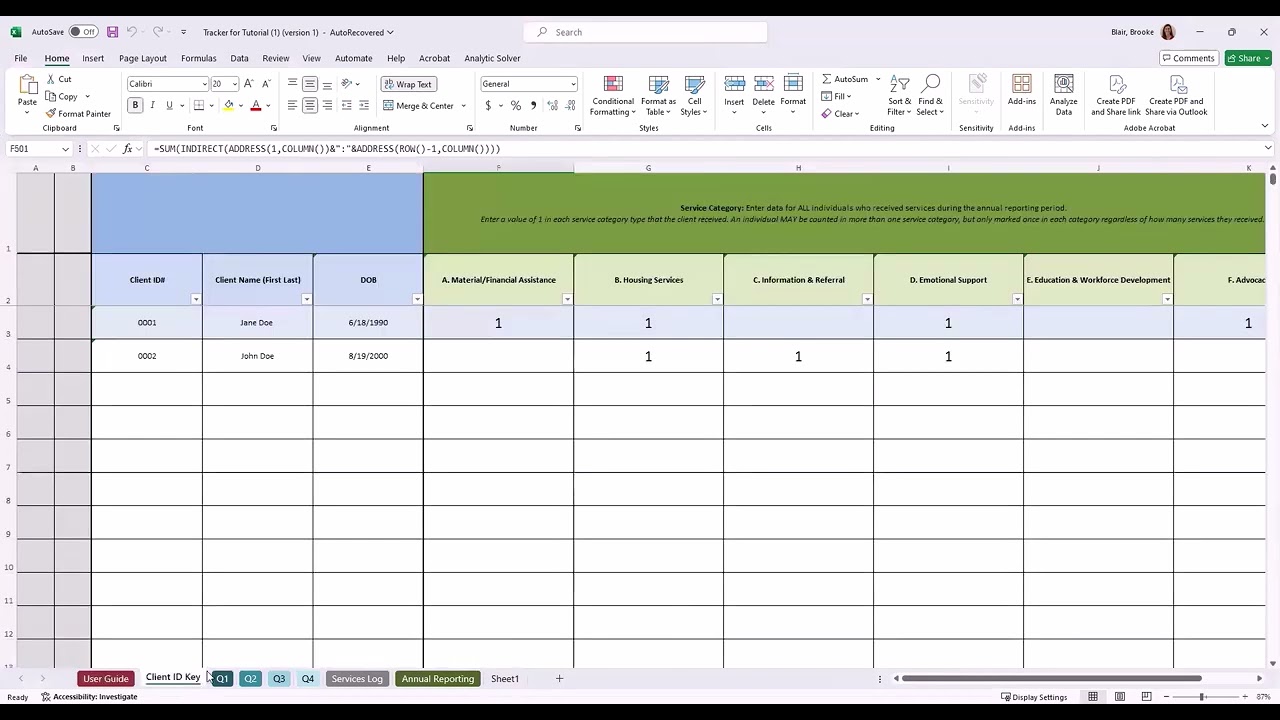
2:08
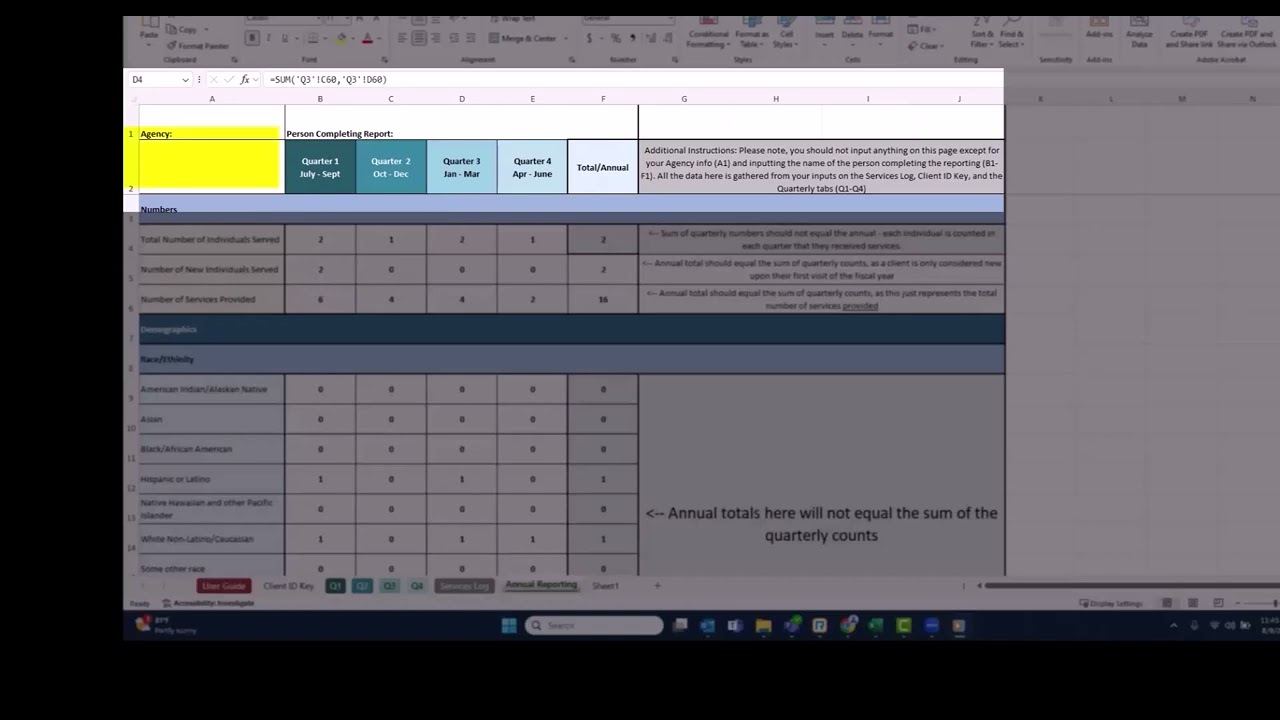
1:50
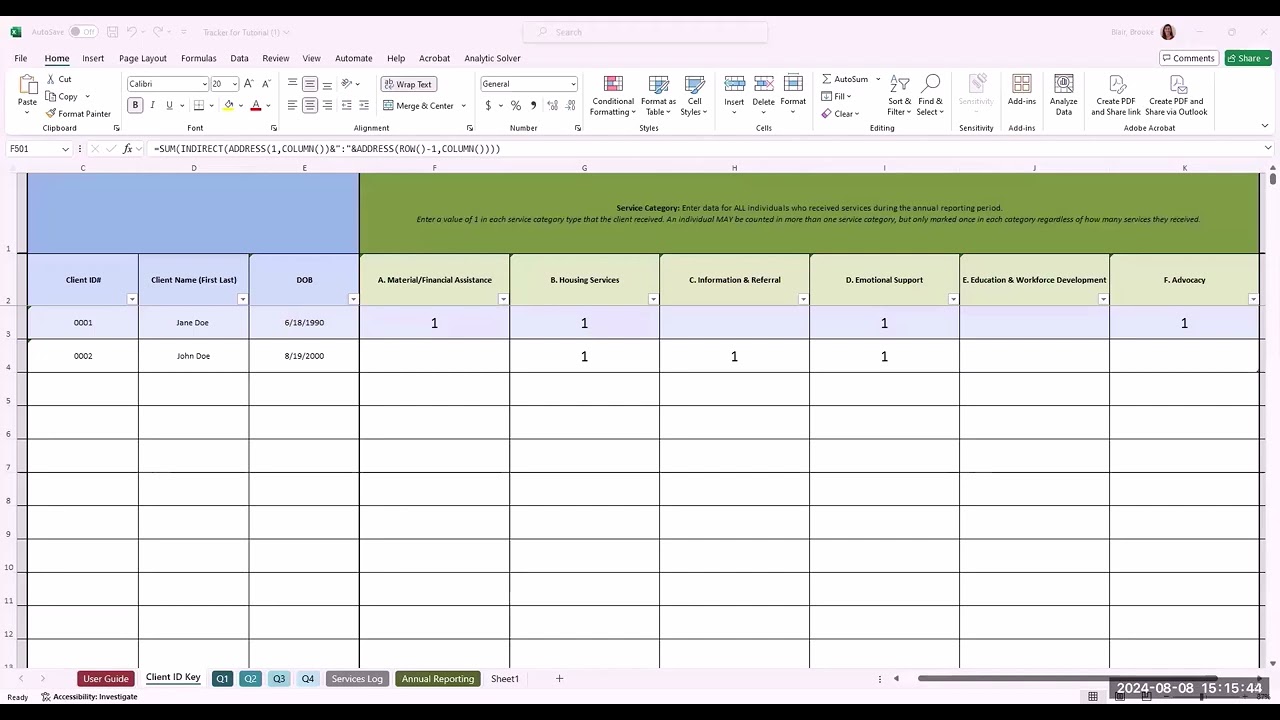
2:08
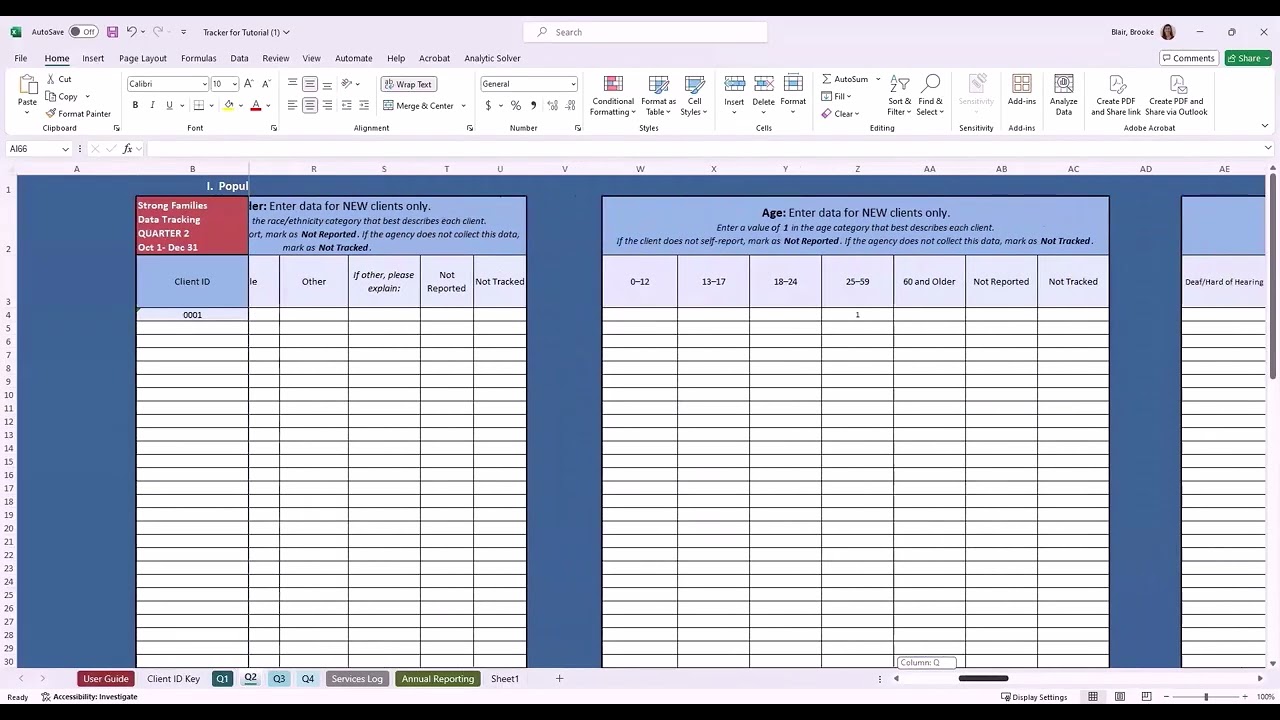
2:24
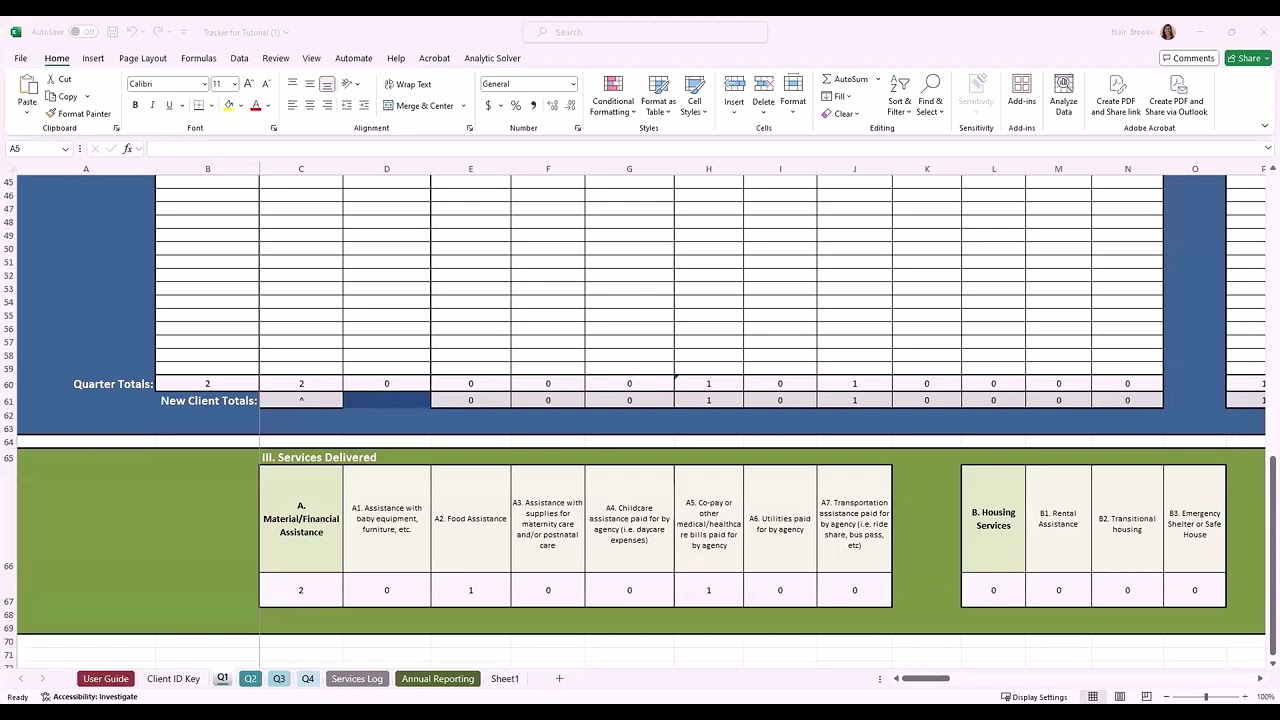
3:05
FAQ
Click each frequently asked question to view an answer. Enter a keyword or phrase in the search box below or select a category to narrow the results.
Category
No results were found. Clear your search filter to view all questions.
Are receipts required with every invoice?
Yes, a copy of receipt will be required with every invoice.
Are there any other requirements to obtain the CEU?
You must attend at least 55 minutes of the 1-hour session to count for the “1 clock hour” that the NASW requires to receive the CEU.
Are we required to use the TSF Tracking tool that SWORPS created?
No, you can use any data tracking system that can gather the data points required by the reports.
Can I apply for the Tennessee Strong Families Grant Program?
The deadline for submitting applications was 1/5/2024. No further applications will be accepted at this time.
Can we consider dads who are working with our Fatherhood program as TSF Clients?
Yes, as long as the dad is currently “expecting” a child. It would fall outside of the scope to serve a dad with TSF funds who already has a child and is not expecting another child.
Did the 60-day window begin on April 1st or on the day all our contract documents were signed and approved which was April 15th?
Your 60-day window begins on the start date of the grant period listed on your grant contract.
Does SWORPS offer CEUs for training Webinars?
Yes, for designated Webinars, SWORPS offers CEUs for online training events. For 1 hour or 1.5 hour trainings, 1 CEU is offered.
For documentation/record keeping purposes (and/or the capability for PII servicing), is an electric record system an allowable cost?
Electronic documentation/record keeping systems are an allowable indirect cost. Laptops or other devices that may be used for record keeping are also allowable costs, but they must only be used for carrying out grant activities.
How do I register for SWORPS training sessions?
By visiting our website, you can view a list of our upcoming training by opening the Upcoming Webinars accordion. You can click on each flyer to get to the Zoom Registration. Once you fill out your information and submit, you will receive a link to join from Zoom. You can also email us at strongfamilies@utk.edu to receive the registration link.
How does advocacy differ from material/financial assistance?
Advocacy happens when you are just talking with a client about potential services and resources they could benefit from. Material and financial assistance occurs when your organization provides the tangible resources they need. For example, if you purchase groceries for a family, that would be counted under material and financial assistance. If you give them information about a nearby food pantry or food resource, that would be advocacy. Material/financial assistance is direct assistance from your agency. Advocacy would include connections/coordination for referrals to additional agencies for services and client needs.
How many CEU credits am I able to obtain virtually that will count toward my social work licensure?
Social workers need to maintain records for their own CEU credits. As of December, 2024, participants are able to count 9 credits from virtual trainings per year. For more information on licensure and CEU questions, please visit the NASW website- https://www.naswtn.com/page/A8.
How often do I need to submit invoices for reimbursement?
The invoice is used to request monthly reimbursement. It is strongly recommended that agencies invoice monthly when monthly expenditures are incurred. However, subrecipient agencies can invoice quarterly. If invoicing quarterly, agencies MUST request reimbursement 30 days after the end of each quarter for all the expenses incurred during the quarter in its entirety.
How should I document when resources are offered for family members of the pregnant mother, such as her 5-year-old child?
Your agency can serve them by meeting their material needs, but should count them under the mother. For example, if you purchase groceries for an expectant mother and her two children, it would all be counted as one service under the expectant mother in the material assistance food category.
How will I know if I received the CEU?
The training coordinator will respond to your follow up materials with an email either asking for more information, or awarding your CEU certificate. Please keep the certificate for your licensure records.
If we are just doing flyers and not creating any major posters or print materials do these have to be approved by our Program Manager?
Yes, all electronic and print media, reports, studies, notices, informational pamphlets, press releases, signs, billboards, DVDs, public awareness kits, training curricula, webinars, websites and similar public notices (written, visual or sound) prepared and released by the Grantee with TNSF grant funds shall include the statement below and must be approved by the FAU Program Manager prior to being prepared or released.
“This project is funded under an agreement with the State of Tennessee.”
If we hire internally, placing current tenured staff into roles, is the expectation we would redo background checks, references and ask them to update resumes to current for this file?
For your staff who are already hired, it may depend on how long they have already been with your organization. The OCJP Grants Manual states in Section VI./Chapter I that criminal background checks need to be updated every 5 years. It would also be important to make sure the background checks you previously conducted meet the requirements for this funding source too. Chapter VI./ Section IV. states that personnel files need to have a resume.
If we provide a Lyft transportation service for one client, to and from their appointment, is that counted as one service or two?
That scenario would count as 1 total service.
In the quarterly report, which category should I document when my organization pays for a client to stay in a hotel for a night?
When your organization pays for a client to stay in a hotel for a night, you should document it under Emergency Housing. You would want to count 1 service for each night the client is provided with a room.
Is it a requirement that TSF client surveys be conducted anonymously?
Anonymity is not required, but encouraged.
Is there a way to view previously recorded Webinars?
Yes, by going to our website and opening the “Recorded Webinars” accordion, you can see all previously recorded Webinars. There is also a list of training slides listed in the bottom of our Website under Training Materials.
Should subcontractors be collecting data?
Yes, all subcontracts should be collecting data. They may use your TSF Quarterly report, or something you have created to capture the work they are doing. Ultimately, subrecipients are responsible for collecting data from project-based subcontractors for monitoring.
The total/annual number of individuals served that shows up on the annual reporting tab of my family tracker does not equal the number of individuals my organization served this year OR does not equal the sum of the individuals served each quarter.
To accurately account for the number of individuals served per quarter, you must enter a value of 1 for each category per client in the Q1-Q4 sheets. To ensure an accurate total for annual individuals served, you need to manually enter a value of 1 for each category your client received during the year in the Client ID Key section. Since this row is meant to calculate the number of individuals that received a certain service category type, the total/annual will not equal the sum of the quarters.
What if some of the service categories are blank in our final report, meaning we did not offer a certain service to any clients during the quarter?
It is okay for a subrecipient to not provide every service that the FAU’s quarterly report is tracking. Your organization should only track services applicable to your program scope. You do not need to create services for your program to fit each category.
What if we have collected extra data points that are not part of the required quarterly report?
The FAU encourages each subrecipient to track data that will be applicable to improving and highlighting their programs. If you have data points you would like to share with the FAU, please submit a 1-2 page report to your Program Manager with your regular quarterly report to let them know what else your organization has accomplished during the quarter.
What is considered supporting documentation?
Supporting documentation includes general ledgers, payroll documents, timesheets, receipts, travel documents, or any other documentation needed to verify time and expenditures are being charged accurately.
What is required for a client to be considered a TSF client for reporting purposes?
Each TSF client that is counted as an individual served in quarterly reports must have a current signed an Acknowledgement of Consent for TSF Services (updated yearly), and the subrecipient must keep a client file for them. They must meet the eligibility requirements for TSF funds as laid out in the solicitation, meaning they are pregnant, or experiencing pregnancy (expectant fathers). Client file requirements can be found in Chapter XX of the OCJP Grants Manual.
What is the best way to utilize volunteers for my Strong Families program?
You can utilize volunteers to advertise your program at outreach events and in the community.
What is the difference between individual and non-therapeutic counseling on the quarterly report?
Individual Counseling should be documented when your client is offered therapy or therapeutic services by a licensed mental health professional. Other types of support such as coaching, options counseling, and wellbeing support that is intended support individuals in making informed decisions and managing their personal and emotional needs throughout their pregnancy journey should be documented as non-therapeutic counseling.
What materials do I need to complete to earn the CEU, and how long do I have to complete them?
After attending the Webinar with your camera on, please submit the attendance affidavit with applicable information and the posttest associated with the training to the Strong Families help desk via email @ strongfamilies@utk.edu within 5 business days of the training event.
What questions are we required to include in our Annual Client Outcome Survey?
By going to the TN Strong Families Fund Source Chapter of the OCJP Grants Manual and clicking on Chapter VII. Reporting and Compliance Requirements, you can find the required survey questions in a link under the Client Annual Outcome Report. You may add any additional questions for your own data collection purposes too.
What things can be documented under other bill/financial assistance in the material/financial assistance section of the quarterly report?
Things documented and claimed in this section must be allowable costs listed in the grants manual and be in line with a subrecipient’s scope and pre-approved contract budget. If you have concerns about whether a certain type of financial assistance is allowable under your grant, please contact your program manager for more information.
When documenting transportation services for my client, should I document the scheduling and the actual transportation as two separate events?
When you schedule transportation for your client, you should count “1” for each full event for your client. For example, the date you book an Uber, and the date the client takes the Uber to AND from the appointment should all be 1 service, not 3.
When is a client considered “new”?
Clients are considered new if they have not received services yet during the current fiscal year. Continuing clients become “new” clients for documentation purposes at the beginning of each fiscal year (July 1).
When should I administer the Client Survey for each client?
It is preferable to administer the Client Survey when the client discharges from your program, or at the end of each fiscal year. If you are unsure that you will see the client for subsequent visits, you can administer the survey at an earlier time.
When speaking of the first two advocacy categories on the quarterly report, the difference between the first (client advocacy) and second (service and support coordination) seems that the second ensures that services are actually provided, 2 is more of a direct referral rather than sharing a resource (1). Is that right?
Yes, you would document Client Advocacy when telling the client about resources or sharing information about something they could benefit from. You would document Service and Support Coordination when you take steps to ensure a client is connected to that service.
When, and how often, is the Client Outcome Survey Report due
The Annual Client Outcome Survey Report is required at the end of each contract year and covers the period of July 1st through June 30th of the fiscal year for which the report is submitted.
Where can I find the nondiscrimination sign I’m supposed to post in my facility?
The non-discrimination signage can be found here: https://www.tn.gov/content/dam/tn/finance/ocjp/Appendix%20C%20-%20Title%20VI%20Poster.pdf
Where can we find required language for subcontracts?
Required language for subcontracts can be found in the OCJP Grants Manual appendices – Attachment E
Which version of the tracker should I use?
If your service date falls between April 1, 2024 and June 30, 2024, use the TNSF Tracking Tool (2023-2024). If your service date falls between July 1, 2024 and June 30, 2025, use the TNSF Tracking Tool (2024-2025).
Who administers the CEUs associated with SWORPS training events?
The National Association of Social Workers (NASW) Tennessee Chapter approves the CEU associated events.
Who do I send my invoices to?
Prior to emailing invoices for reimbursement to OBF, TNSF subrecipients must email a copy of the invoice and supporting documentation to their grant program manager.
Who from our staff do we need to keep Civil Rights Compliance Training certificates on file for?
OCJP requires that all grant Project Directors and the Civil Rights Compliance Officers provide evidence of having completed Civil Rights training provided on the OCJP website annually. All new Project Directors must complete the training program within ninety (90) days of their start date. At the end of the online quiz, Project Directors should retain verification of completion in the grant file. The Project Director and the Civil Rights Compliance Officer should complete this training annually. Verification of the training must be retained in the personnel files. subrecipient agencies must train other staff members by using the training program on OCJP’s website or another training program that includes information on Civil Rights compliance. Although staff members other than the Project Directors may complete the online quiz at the end of OCJP’s training program, they are not required to do so. Project Directors are responsible for maintaining documentation showing that staff members completed the required Civil Rights training annually.
Will there be another round of funding for the TN Strong Families Grant Program?
There is currently no news on additional Strong Families funding. However, you can check the FAU website for updates on future application opportunities.
Can I apply for the Tennessee Strong Families Grant Program?
The deadline for submitting applications was 1/5/2024. No further applications will be accepted at this time.
Will there be another round of funding for the TN Strong Families Grant Program?
There is currently no news on additional Strong Families funding. However, you can check the FAU website for updates on future application opportunities.
Are receipts required with every invoice?
Yes, a copy of receipt will be required with every invoice.
How often do I need to submit invoices for reimbursement?
The invoice is used to request monthly reimbursement. It is strongly recommended that agencies invoice monthly when monthly expenditures are incurred. However, subrecipient agencies can invoice quarterly. If invoicing quarterly, agencies MUST request reimbursement 30 days after the end of each quarter for all the expenses incurred during the quarter in its entirety.
What is considered supporting documentation?
Supporting documentation includes general ledgers, payroll documents, timesheets, receipts, travel documents, or any other documentation needed to verify time and expenditures are being charged accurately.
Who do I send my invoices to?
Prior to emailing invoices for reimbursement to OBF, TNSF subrecipients must email a copy of the invoice and supporting documentation to their grant program manager.
Did the 60-day window begin on April 1st or on the day all our contract documents were signed and approved which was April 15th?
Your 60-day window begins on the start date of the grant period listed on your grant contract.
If we are just doing flyers and not creating any major posters or print materials do these have to be approved by our Program Manager?
Yes, all electronic and print media, reports, studies, notices, informational pamphlets, press releases, signs, billboards, DVDs, public awareness kits, training curricula, webinars, websites and similar public notices (written, visual or sound) prepared and released by the Grantee with TNSF grant funds shall include the statement below and must be approved by the FAU Program Manager prior to being prepared or released.
“This project is funded under an agreement with the State of Tennessee.”
Where can I find the nondiscrimination sign I’m supposed to post in my facility?
The non-discrimination signage can be found here: https://www.tn.gov/content/dam/tn/finance/ocjp/Appendix%20C%20-%20Title%20VI%20Poster.pdf
Where can we find required language for subcontracts?
Required language for subcontracts can be found in the OCJP Grants Manual appendices – Attachment E
If we hire internally, placing current tenured staff into roles, is the expectation we would redo background checks, references and ask them to update resumes to current for this file?
For your staff who are already hired, it may depend on how long they have already been with your organization. The OCJP Grants Manual states in Section VI./Chapter I that criminal background checks need to be updated every 5 years. It would also be important to make sure the background checks you previously conducted meet the requirements for this funding source too. Chapter VI./ Section IV. states that personnel files need to have a resume.
What is the best way to utilize volunteers for my Strong Families program?
You can utilize volunteers to advertise your program at outreach events and in the community.
Who from our staff do we need to keep Civil Rights Compliance Training certificates on file for?
OCJP requires that all grant Project Directors and the Civil Rights Compliance Officers provide evidence of having completed Civil Rights training provided on the OCJP website annually. All new Project Directors must complete the training program within ninety (90) days of their start date. At the end of the online quiz, Project Directors should retain verification of completion in the grant file. The Project Director and the Civil Rights Compliance Officer should complete this training annually. Verification of the training must be retained in the personnel files. subrecipient agencies must train other staff members by using the training program on OCJP’s website or another training program that includes information on Civil Rights compliance. Although staff members other than the Project Directors may complete the online quiz at the end of OCJP’s training program, they are not required to do so. Project Directors are responsible for maintaining documentation showing that staff members completed the required Civil Rights training annually.
For documentation/record keeping purposes (and/or the capability for PII servicing), is an electric record system an allowable cost?
Electronic documentation/record keeping systems are an allowable indirect cost. Laptops or other devices that may be used for record keeping are also allowable costs, but they must only be used for carrying out grant activities.
Are we required to use the TSF Tracking tool that SWORPS created?
No, you can use any data tracking system that can gather the data points required by the reports.
Can we consider dads who are working with our Fatherhood program as TSF Clients?
Yes, as long as the dad is currently “expecting” a child. It would fall outside of the scope to serve a dad with TSF funds who already has a child and is not expecting another child.
How does advocacy differ from material/financial assistance?
Advocacy happens when you are just talking with a client about potential services and resources they could benefit from. Material and financial assistance occurs when your organization provides the tangible resources they need. For example, if you purchase groceries for a family, that would be counted under material and financial assistance. If you give them information about a nearby food pantry or food resource, that would be advocacy. Material/financial assistance is direct assistance from your agency. Advocacy would include connections/coordination for referrals to additional agencies for services and client needs.
How should I document when resources are offered for family members of the pregnant mother, such as her 5-year-old child?
Your agency can serve them by meeting their material needs, but should count them under the mother. For example, if you purchase groceries for an expectant mother and her two children, it would all be counted as one service under the expectant mother in the material assistance food category.
If we provide a Lyft transportation service for one client, to and from their appointment, is that counted as one service or two?
That scenario would count as 1 total service.
In the quarterly report, which category should I document when my organization pays for a client to stay in a hotel for a night?
When your organization pays for a client to stay in a hotel for a night, you should document it under Emergency Housing. You would want to count 1 service for each night the client is provided with a room.
Is it a requirement that TSF client surveys be conducted anonymously?
Anonymity is not required, but encouraged.
Should subcontractors be collecting data?
Yes, all subcontracts should be collecting data. They may use your TSF Quarterly report, or something you have created to capture the work they are doing. Ultimately, subrecipients are responsible for collecting data from project-based subcontractors for monitoring.
The total/annual number of individuals served that shows up on the annual reporting tab of my family tracker does not equal the number of individuals my organization served this year OR does not equal the sum of the individuals served each quarter.
To accurately account for the number of individuals served per quarter, you must enter a value of 1 for each category per client in the Q1-Q4 sheets. To ensure an accurate total for annual individuals served, you need to manually enter a value of 1 for each category your client received during the year in the Client ID Key section. Since this row is meant to calculate the number of individuals that received a certain service category type, the total/annual will not equal the sum of the quarters.
What if some of the service categories are blank in our final report, meaning we did not offer a certain service to any clients during the quarter?
It is okay for a subrecipient to not provide every service that the FAU’s quarterly report is tracking. Your organization should only track services applicable to your program scope. You do not need to create services for your program to fit each category.
What if we have collected extra data points that are not part of the required quarterly report?
The FAU encourages each subrecipient to track data that will be applicable to improving and highlighting their programs. If you have data points you would like to share with the FAU, please submit a 1-2 page report to your Program Manager with your regular quarterly report to let them know what else your organization has accomplished during the quarter.
What is required for a client to be considered a TSF client for reporting purposes?
Each TSF client that is counted as an individual served in quarterly reports must have a current signed an Acknowledgement of Consent for TSF Services (updated yearly), and the subrecipient must keep a client file for them. They must meet the eligibility requirements for TSF funds as laid out in the solicitation, meaning they are pregnant, or experiencing pregnancy (expectant fathers). Client file requirements can be found in Chapter XX of the OCJP Grants Manual.
What is the difference between individual and non-therapeutic counseling on the quarterly report?
Individual Counseling should be documented when your client is offered therapy or therapeutic services by a licensed mental health professional. Other types of support such as coaching, options counseling, and wellbeing support that is intended support individuals in making informed decisions and managing their personal and emotional needs throughout their pregnancy journey should be documented as non-therapeutic counseling.
What questions are we required to include in our Annual Client Outcome Survey?
By going to the TN Strong Families Fund Source Chapter of the OCJP Grants Manual and clicking on Chapter VII. Reporting and Compliance Requirements, you can find the required survey questions in a link under the Client Annual Outcome Report. You may add any additional questions for your own data collection purposes too.
What things can be documented under other bill/financial assistance in the material/financial assistance section of the quarterly report?
Things documented and claimed in this section must be allowable costs listed in the grants manual and be in line with a subrecipient’s scope and pre-approved contract budget. If you have concerns about whether a certain type of financial assistance is allowable under your grant, please contact your program manager for more information.
When documenting transportation services for my client, should I document the scheduling and the actual transportation as two separate events?
When you schedule transportation for your client, you should count “1” for each full event for your client. For example, the date you book an Uber, and the date the client takes the Uber to AND from the appointment should all be 1 service, not 3.
When is a client considered “new”?
Clients are considered new if they have not received services yet during the current fiscal year. Continuing clients become “new” clients for documentation purposes at the beginning of each fiscal year (July 1).
When should I administer the Client Survey for each client?
It is preferable to administer the Client Survey when the client discharges from your program, or at the end of each fiscal year. If you are unsure that you will see the client for subsequent visits, you can administer the survey at an earlier time.
When speaking of the first two advocacy categories on the quarterly report, the difference between the first (client advocacy) and second (service and support coordination) seems that the second ensures that services are actually provided, 2 is more of a direct referral rather than sharing a resource (1). Is that right?
Yes, you would document Client Advocacy when telling the client about resources or sharing information about something they could benefit from. You would document Service and Support Coordination when you take steps to ensure a client is connected to that service.
When, and how often, is the Client Outcome Survey Report due
The Annual Client Outcome Survey Report is required at the end of each contract year and covers the period of July 1st through June 30th of the fiscal year for which the report is submitted.
Which version of the tracker should I use?
If your service date falls between April 1, 2024 and June 30, 2024, use the TNSF Tracking Tool (2023-2024). If your service date falls between July 1, 2024 and June 30, 2025, use the TNSF Tracking Tool (2024-2025).
Are there any other requirements to obtain the CEU?
You must attend at least 55 minutes of the 1-hour session to count for the “1 clock hour” that the NASW requires to receive the CEU.
Does SWORPS offer CEUs for training Webinars?
Yes, for designated Webinars, SWORPS offers CEUs for online training events. For 1 hour or 1.5 hour trainings, 1 CEU is offered.
How do I register for SWORPS training sessions?
By visiting our website, you can view a list of our upcoming training by opening the Upcoming Webinars accordion. You can click on each flyer to get to the Zoom Registration. Once you fill out your information and submit, you will receive a link to join from Zoom. You can also email us at strongfamilies@utk.edu to receive the registration link.
How many CEU credits am I able to obtain virtually that will count toward my social work licensure?
Social workers need to maintain records for their own CEU credits. As of December, 2024, participants are able to count 9 credits from virtual trainings per year. For more information on licensure and CEU questions, please visit the NASW website- https://www.naswtn.com/page/A8.
How will I know if I received the CEU?
The training coordinator will respond to your follow up materials with an email either asking for more information, or awarding your CEU certificate. Please keep the certificate for your licensure records.
Is there a way to view previously recorded Webinars?
Yes, by going to our website and opening the “Recorded Webinars” accordion, you can see all previously recorded Webinars. There is also a list of training slides listed in the bottom of our Website under Training Materials.
What materials do I need to complete to earn the CEU, and how long do I have to complete them?
After attending the Webinar with your camera on, please submit the attendance affidavit with applicable information and the posttest associated with the training to the Strong Families help desk via email @ strongfamilies@utk.edu within 5 business days of the training event.
Who administers the CEUs associated with SWORPS training events?
The National Association of Social Workers (NASW) Tennessee Chapter approves the CEU associated events.
Resources
Training Materials
Webinar Slides
CEU Information
Resource Materials
Articulate Courses
Technical Assistance Tools
Grant Documentation & Compliance
Data Collection & Service Documentation
Client Resources
Pregnancy Resources (English & Spanish)
ECD Resources (English & Spanish)
Strong Families Community Resources Reference Sheet
Parenthood & Rights Reference Sheet (English & Spanish)
Mental Health, Substance Use, and Crisis Resources
Baby Care and Birth Planning Checklist
Understanding Positive Childhood Experiences
Resources for Prenatal Loss and Grief
This project is funded under an agreement with the State of Tennessee.
